Automotive
Continuous Self-Reinvention
As automotive whooshes semi-silently toward an electric future, stakeholders must keep pace with constantly changing regulations. The Hungarian Investment Promotion Agency reveals how investors adjust their strategies to these circumstances and what awaits suppliers down the road. 14

Hungarian R&D Hubs Drive Cars Towards Safer Future
Continental Hungary is at the forefront of efforts to make driving safer, with operations nationwide offering AI-fueled software and technological solutions and developments for sensors and brake systems. 15
SOCIALITE
Shining the Spotlight on Hungarian Literature
Bookworm David Holzer discovers the Petőfi Cultural Agency, which, among other things, promotes Hungarian literature in translation, and his eyes light up behind his reading glasses. 20
Winning
With Hungary
Recession Ongoing, Outlook Remains Uncertain
Hungary, for the third time in a row, reported a drop in GDP in the first quarter of 2023, meaning the technical recession that started in H2 2022 has continued into this year. 3
Matt Zeller, country president for Novartis Hungary and a shortlisted candidate for the Expat CEO of the Year award, tells us what the nomination means and the plans for the company here. 8

Hungarians Need More Selfcare, Allianz Survey Reveals
Hungarians are among the least prepared for retirement and healthcare costs in the region, according to a recent survey by Allianz Hungária. They are also less aware of the risks and challenges they may face in their old age. 13
NEWS
HUNGARY’S PRACTICAL BUSINESS BI-WEEKLY SINCE 1992 | WWW.BUDAPESTBUSINESSJOURNAL.COM HUF 2,100 | EUR 5 | USD 6 | GBP 4 VOL. 31. NUMBER 10 | MAY 19 – JUNE 1, 2023
SPECIAL REPORT INSIDE THIS ISSUE BUSINESS
BUSINESS
EDITOR-IN-CHIEF: Robin Marshall
EDITORIAL CONTRIBUTORS: Balázs Barabás, Zsófia Czifra, Kester Eddy, Bence Gaál, Gergely Herpai, David Holzer, Gary J. Morrell, Nicholas Pongratz.
LISTS: BBJ Research (research@bbj.hu)

NEWS AND PRESS RELEASES:

Should be submitted in English to news@bbj.hu
LAYOUT: Zsolt Pataki

PUBLISHER: Business Publishing Services Kft.


CEO: Tamás Botka
ADVERTISING: AMS Services Kft.
CEO: Balázs Román
SALES: sales@bbj.hu
CIRCULATION AND SUBSCRIPTIONS: circulation@bbj.hu
Address: Madách Trade Center
1075 Budapest, Madách Imre út 13-14, Building B, 7th floor. Telephone +36 (1) 398-0344, Fax +36 (1) 398-0345, www.bbj.hu
The Budapest Business Journal, HU ISSN 1216-7304, is published bi-weekly on Friday, registration No. 0109069462. It is distributed by HungaroPress.

Reproduction or use without permission of editorial or graphic content in any manner is prohibited. ©2017
BUSINESS MEDIA SERVICES
VISIT US ONLINE: WWW.BBJ.HU

Why Support the BBJ?
• Independence. The BBJ’s journalism is dedicated to reporting fact, not politics, and isn’t reliant on advertising from the government of the day, whoever that might be.
• Community Building. Whether it is the Budapest Business Journal itself, the Expat CEO award, the Expat CEO gala, the Top Expat CEOs in Hungary publication, or the new Expat CEO Boardroom meeting, we are serious about doing our part to bind this community together.
• Value Creation. We have a nearly 30-year history of supporting the development of diversity and sustainability in Hungary’s economy. The fact that we have been a trusted business voice for so long, indeed we were the first English-language publication when we launched back on November 9, 1992, itself has value.
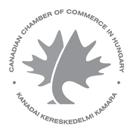

• Crisis Management. We have all lived through a once-in-a-century pandemic. But we also face an existential threat through climate change and operate in a period where disruptive technologies offer threats and opportunities. Now, more than ever, factual business reporting is vital to good decision-making.
For more information visit budapestbusinessjournal.com
LIFELONG LEARNING HAS LESSONS FOR ALL
Although the theme of our Special Report in this issue is the Automotive Industry, there is also something of an educational strand running through our pages.
There are the ambitious plans of Budapest Metropolitan University, which already claims to be the most significant and most international private university but wants to expand by 40%, taking the total student numbers to 10,000.
Then there’s Corvinus University of Budapest, the first foundation-run higher education establishment in Hungary, and its lofty goal of building a school for the “socially responsible.”
But those are only the most obvious examples. We also report on Allianz Hungária’s research that shows Hungarians are among the least prepared for retirement or coping with healthcare costs in the region. The lesson here is that the population must learn more about self-care and improve their financial literacy, the insurer says.
The national CyberShield program, which seeks to protect civilians and companies alike from the dangers of cybercrime, has expanded with a new authority coming on board. It is a cross-disciplinary approach that could, perhaps should, be used elsewhere. At the core of it is a need to raise awareness about how e-fraudsters work, but what that really boils down to is children learning how to protect their online identity, adults swatting up on how to use online banking safely, and businesses ensuring their staff are adequately trained in cybersecurity, not least what to share and with whom.
The annual GreenTech conference returns for a fourth year at the Zalaegerszeg ZalaZone automotive proving track. The automobile is only a small, if significant, part of what it does, encompassing energy sources, efficiency, and savings, among other things. Hydrogen and nuclear power are also on the agenda.
But a crucial part of what the conference does is reach out to local schools. The aim is to educate and inspire the next generation. In total, some 2,000 students have been given free access to the event. When it comes to saving the planet, you can never start too early.
Automotive players also believe in the maxim, “Get them while they’re young.” The German automakers, in particular, have helped shape teaching methods here by importing the dual education method from their home country. But they are also partnering ever more with universities to help set the curriculum and share real-world R&D projects.
This leads me back to something Anthony Radev, the president of Corvinus, said. We are used to bosses complaining that graduates score highly on book learning and poorly on soft skills. The president thinks CEOs mean that graduates don’t know how their specific businesses work.
“There are 28 sectors in the economy. I cannot prepare people for all 28 sectors in the same depth. But we are willing to bring in people from those sectors so our students see how to apply theoretical frameworks in real life,” he says. Even educators can learn.
Robin Marshall Editor-in-chief
THEN & NOW

2 | 1 News www.bbj.hu Budapest Business Journal | May 19 – June 1, 2023
LLC
all rights
with
reserved.
What We Stand For: The Budapest Business Journal aspires to be the most trusted newspaper in Hungary. We believe that managers should work on behalf of their shareholders. We believe that among the most important contributions a government can make to society is improving the business and investment climate so that its citizens may realize their full potential.
IMPRESSUM BBJ-PARTNERS THE EDITOR SAYS
The color photo from MTI shows Szeged Contemporary Ballet’s performance of Carmina Burana following the opening of the XXV International Contemporary Dance Festival at the Agóra Veszprém Cultural Center on May 15, 2023. The annual festival forms part of the official Veszprém-Balaton European Capital of Culture program this year. The black and white image from the Fortepan public archive shows Etel Nagy, a dance and movement artist and choreographer, in 1930, in an unspecified Hungarian location.
Photo by MTI/Vasvári Tamás
Photo by Fortepan / Formanekné Nagy Zsuzsanna
Recession Continues, Outlook Remains Uncertain
Hungary, for the third time in a row, reported a drop in GDP in the first quarter of 2023, meaning the technical recession that started in H2 2022 has continued into this year. ZSÓFIA
Not entirely surprisingly, the technical recession in Hungary continued in the first quarter of 2023 as gross domestic product for January-March saw a 0.2% contraction. This marks the third quarter of sequential contraction in the volume of GDP, with high uncertainty regarding the next quarter, according to analysts.
As the latest data released by the Central Statistical Office (KSH) shows, Hungary’s GDP decreased by 0.9% according to raw data and by 1.1% according to seasonally and calendar adjusted and reconciled data in the first quarter of 2023, when compared to the corresponding period of the previous year.
Compared to Q4 of 2022, the economic performance diminished by 0.2%
according to seasonally and calendaradjusted and reconciled data. The most significant contributor to the decrease in performance was industry, though the good figures from agriculture and services moderated the decline. The main contributor to the growth in services was health activities, approximating the level before the coronavirus pandemic, KSH says.
Despite the not-so-good news, the Hungarian government remains optimistic about the future. According to a note released by the Ministry of Economic Development, the drop in economic performance is only “temporary” and mainly due to “war inflation” and the sanctions the EU has imposed on Russia.
“Despite the temporary setback in GDP, economic growth of 1.5% can be maintained,” the ministry insisted in its note.
According to the government’s expectations, the decline in economic performance has reached its lowest point at this level, and due to the targeted measures, more favorable growth processes will already be observed in the second quarter of the year. In the
Changes in the Gross Domestic Product in Hungary, 2010-2023 (Q1)
second half of 2023, a new, more radical growth phase will begin so that the Hungarian economy can take off again, the government anticipates.
Long but Shallow
However, the Hungarian recession has been the longest in the EU: in the third quarter of 2022, the decline was 0.8%, in Q4 it was 0.6%, and now 0.2%. The good news is that the Hungarian recession, despite its extension into three quarters, cannot be called deep.
As this was a preliminary release by the KSH, there is no detailed data yet, analysts at ING Bank point out.
“We will assess the factors contributing to the decline in real GDP once we have the complete picture on June 1, when detailed data is released,” the bank analysts say.
“However, the KSH highlighted that the largest contributor to the decrease in economic performance was industry. This is hardly surprising given that industry posted 6-10%
year-on-year declines in production volumes throughout the first quarter,” they note.
The positive performance of agriculture was also emphasized, but ING analysts think the outperformance
is more attributable to technical base effects rather than actual economic performance. The positive contribution this time can be attributed to the comparison with last year’s droughtrelated exceptionally poor performance, resulting in a low base effect.
“Going forward, the lack of monthly economic data for the second quarter limits our ability to predict whether the technical recession will continue or not. In this regard, the detailed release on June 1 might give us some clues. However, given sky-high inflation and the depletion of household savings, meaningful domestic consumption in the second quarter seems unlikely,” the ING analysis reads.

The bank also emphasizes that investment activity is rapidly collapsing due to the high interest rate environment; thus, from a GDP contribution point of view, both components will likely drag on growth.
Silver Lining?
“The only silver lining could be net exports; however, judging by the recent underperformance of industry, we see little chance for an early rebound in the second quarter. In our view, judging by the data available now, it would be considered a positive surprise if the economy manages to avoid a quarterly downturn,” ING concludes.
As for the year as a whole, currently available data suggests a modest annual growth rate of 0.2%, followed by approximately 3% GDP expansion in 2024. However, should the technical recession extends into the second quarter of this year, a downgrade to zero or even into negative territory may be unavoidable, ING analysts warn.
At the same time, the European Bank of Reconstruction and Development improved its forecast for the Hungarian economy, its forecast being released on the same day the first quarter GDP data was out. In its latest Regional Economic Prospects, EBRD said Hungary’s economy could grow by 0.4% this year, a slight but notable improvement from its February forecast, when it predicted a 0.2% decline.
“Going forward, the lack of monthly economic data for the second quarter limits our ability to predict whether the technical recession will continue or not. In this regard, the detailed release on June 1 might give us some clues. However, given sky-high inflation and the depletion of household savings, meaningful domestic consumption in the second quarter seems unlikely.”
The EBRD said GDP growth would slow this year, from
4.6%
in 2022, as household purchasing power declines amid high inflation and government consumption shrinks due to budgetary restraint. FDI inflows and other private investments are expected to support GDP growth this year, “but EU funds, especially those from the RRF, will likely reach Hungary only in late 2023 or 2024,” it added.
The EBRD then sees Hungary’s GDP growth picking up to 3.5% in 2024 as external demand improves and real incomes recover.
However, to put the Hungarian economy into its European context, in terms of growth compared to the previous quarter, Hungary’s Q1 data was the fourth worst in the EU and the second worst on an annual basis.
www.bbj.hu Budapest Business Journal | May 19 – June 1, 2023 1
• macroscope
News
CZIFRA
Quarterly change in GDP* Rate of annual economic growth* * Seasonally and calendar adjusted and balanced data Source:
Industrial Market Developing in Cities Across Hungary
Total stock in the Hungarian industrial market had reached 4.7 million sqm as of the end of the first quarter, according to the Budapest Research Forum (BRF), consisting of CBRE, Colliers, Cushman & Wakefield, Eston International, JLL, and Robertson Hungary. Total stock in the Greater Budapest area stands at 3.3 million sqm, while in the provincial countryside, it has reached some 1.4 million sqm.
In the first quarter of the year, the Greater Budapest speculative stock increased by five buildings, totaling 111,000 sqm, while in Hungary’s region, four new buildings were handed over, totaling 45,800 sqm.
The largest new industrial/logistics delivery in Greater Budapest was in Maglód, on the eastern boundary of the capital, with some 46,000 sqm of space developed by HelloParks, part of the Futureal group. The developer and park operator Prologis also delivered the 18,600 DC2A building to the south in Prologis Park Sziget II.
The most significant new delivery in provincial Hungary was Cordys Capital Miskolc P2, adding
20,000 sqm
to the regional stock. Another notable addition was the 10,900 sqm Inpark Nagykanizsa, some 207 km by road southwest of Budapest.
The total industrial stock for Hungary of 4.7 million sqm compares to almost 11 million sqm in the Czech Republic,
according to Cushman & Wakefield. The largest delivery in that country in the first quarter was the 48,000 sqm Panattoni Park Cheb South, in the Karlovy Vary region.
The Czech market has a further 1.2 million sqm under construction, including the 61,000 sqm Panattoni Park Pilsen West II. Notably, the most significant deliveries and pipeline projects are in regional industrial hubs away from the capital.
The overall industrial vacancy rate in the Czech Republic stands at just 1.3%. In Hungary, the figure at the end of the first quarter was 5.9% in Greater Budapest and 6.4% outside of the capital. On the national average, the rate stands at 6%.
Demand (Slightly) Down
Total demand in Greater Budapest amounted to 107,000 sqm, indicating a decrease of 15% year-on-year, according to Cushman & Wakefield. The largest transaction outside Budapest was a pre-lease agreement of 25,000 sqm at VGP Park Győr Beta, while in Greater Budapest, the largest lease agreement was a renewal for 23,000 sqm at Prologis Park Gyál. Renewals accounted for 45% of gross take-up.
In Q1, 25 leasing transactions were registered in Greater Budapest, with an average transaction size of 4,280 sqm, although three were for more than 10,000 sqm. The majority of leases continued to be concluded
Real Estate Matters
A biweekly look at real estate issues in Hungary and the region
in big-box logistics parks, while eight agreements were registered in city logistics parks, according to BRF.
Cushman & Wakefield have recorded 157,000 sqm of new supply in Hungary in the first quarter of 2023. The consultancy has traced 544,600 sqm of industrial space that is under construction and due to be completed in

2023-2024,
418,000 sqm of which is in the Greater Budapest area. From this, 30% of the space is pre-let.
The total industrial stock for Hungary of 4.7 million sqm compares to almost 11 million sqm in the Czech Republic, according to Cushman & Wakefield.
The most significant planned completion is the 118,400 sqm CTPark Sziget, in addition to the 58,400 sqm HelloParks Páty-PT1 and the 45,300 sqm HelloParks Fót. Outside of the capital, VGP is due to deliver the 30,400 sqm VGP Győr Beta II, and CTP is developing the 33,600 sqm CTP Tatabánya. Notably, CTP and VGP have projects both in the Greater Budapest area and in the provincial hubs.
The prime Hungarian industrial yield has moved out by 75 basis points to 6.25%. This compares to 5% for the Czech Republic.

4 | 1 News www.bbj.hu Budapest Business Journal | May 19 – June 1, 2023
GARY J. MORRELL
HelloParks Fót logistics park.
HelloParks Páty construction.
OTP Rebuts Ukraine’s Claim it is an International War Sponsor Roundup Crisis Ukraine
Ukraine’s National Agency on Corruption Prevention (NACP) sparked controversy in Hungary when it included the country’s largest lender, OTP Bank, in a list of “international sponsors of war” in an announcement posted on the agency’s website. NACP cited the bank management’s decision to continue its operations in Russia and its recognition of the “so-called Donetsk and Luhansk ‘people’s republics’” as the primary reasons for including the lender on the list.
NICHOLAS PONGRATZ
OTP Bank angrily responded that its inclusion on the list was “completely undeserved” in a statement it sent to state news agency MTI.
OTP Bank has subsidiary banks in Croatia, Slovenia, Slovakia, Montenegro, Romania, and Ukraine, as well as Russia, but the NACP announcement emphasized that the lender remains among the 50 largest banks in the latter country, serving more than 2.2 million customers across 1,850 locations there.





NACP added that OTP Bank’s market leadership in specific fields in Russia, such as ranking second in point-of-sale lending, with a market share of 15.3%,

and eighth in the country’s credit card market, underscored its importance to Russia’s economy,


“which is struggling with and trying to circumvent Western sanctions.”

The agency also claimed that OTP Bank provides loans to the Russian military at preferential rates and that Russians called up for military service are able to apply for deferment on credit and loan payments with the lender.
In referencing “Law of the Russian Federation No. 377-FZ of October 7, 2022,” NACP said that OTP Bank implicitly recognized the illegal referendums held in Donetsk and Luhansk that declared the regions’ independence and annexation by Russia.
“Thus, by continuing the financial operations of the Russian unit,” the announcement concluded, “OTP Group clearly demonstrates support and sponsorship of terrorism.”
OTP’s Rebuttal
OTP Bank’s statement of denial in response went into some detail.
“OTP Bank condemns all aggression against sovereign states, including that against Ukraine, and is committed to supporting Ukrainian citizens and the country’s economy,” the lender said.
“In addition to maintaining continuous service and lending activities, our bank has assisted Ukraine with humanitarian support in the billions of forints and offered long-term accommodation and provisions for several hundred war refugees,” it added.
The Hungarian bank went on to refute what it called a number of “false claims” made by NACP, such as those which highlighted its importance to the Russian economy. OTP Bank said its market share in Russia stood at just 0.17%, while foreign-owned banks with “significantly larger” market shares in the country had not
been included on the list. The bank also denied that it offered “preferential credit” terms to the Russian military and disputed its “recognition
of the existence of the Donetsk and Luhansk ‘people’s republics.’”

During a break in a meeting of European Union foreign ministers in Stockholm on May 12, Minister of Foreign Affairs and Trade Péter Szijjártó called the inclusion of OTP Bank on the war sponsorship list “scandalous” and “unacceptable,” adding that OTP Bank had “not broken any rules.” While the bank remained on the list, Szijjárto said it would be “very difficult” for the Hungarian government to negotiate on further sanctions requiring additional sacrifices.
Hungary subsequently blocked the disbursement of the eighth tranche of funds from the European Peace Facility worth EUR 500 million for arms from EU member states destined for Ukraine, Italian news wire Ansa reported on May 15. Although the EUR 500 mln tranche was set to be paid on Monday, May 22, Budapest put that on hold, allegedly demanding “guarantees” that the European Commission will not use the European Peace Facility exclusively to help Ukraine in the future.
1 News | 5 www.bbj.hu Budapest Business Journal | May 19 – June 1, 2023
ADVERTISEMENT 5 June 2023 HOTEL MARRIOTT BUDAPEST BOOK YOUR TICKET #budapestgeothermalenergysummit J O I N T H E B I G G E S T G E O T H E R M A L E V E N T O F T H E R E G I O N ! Powered by
File photo shows an OTP Bank branch on Malaya Pokrovskaya Street, Nizhny Novgorod, in central Russia, on March 25, 2016.
Photo by VladimirMPetrov / Shutterstock.com
British Embassy Marks Coronation With Garden Party
An estimated 550 people filled the grounds of the British Ambassador’s Residence on May 11 for a garden party marking the coronation of King Charles III, enjoying the excellent weather alongside food and beverages provided by many of the sponsors.

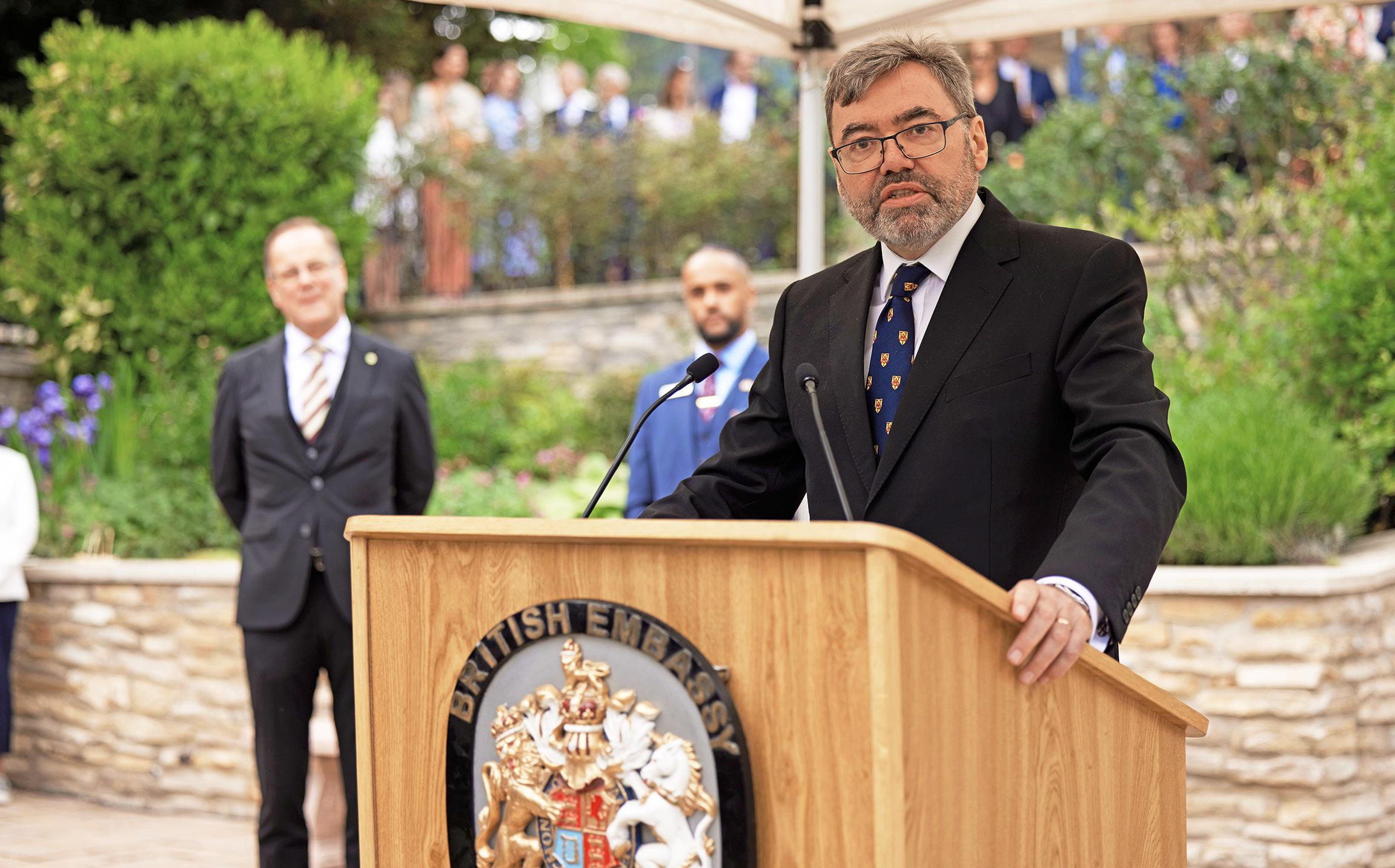
Plenty of guests from the British community were in attendance, naturally, and Hungarians with links to British brands or interests. Prominent guests included Sándor Csányi, the chairman and CEO of OTP Bank, owner of agricultural and food company Bonafarm Group, and chairman of the Hungarian Football Federation (MLSZ). There were also at least two ministers in attendance: Tibor Navracsics, Minister for Regional Development and Utilization of EU funds, and Minister of Finance Mihály Varga.
“It’s hard to believe that it’s just a little less than a year ago that we were here, marking her late Majesty’s Platinum
Jubilee. So much has happened in that time,” British Ambassador Paul Fox reflected. A period of “reflection, remembrance, but also a celebration of a life well lived” followed the Queen’s death. “However, the strength of our institutions and traditions ensured a smooth transition” to the pomp and ceremony of the coronation on May 6.
The ambassador noted that Hungary’s President Katalin Novák had represented Hungary at the coronation, the latest sign of the strength of the relationship between the two countries. That has been strengthened, he said, with the recent launch of the bilateral Chain Bridge Forum.
“This is a forum where we can strengthen existing cooperation but also explore where we differ in a constructive
manner based on mutual respect. It is a relationship based on developing our prosperity,” Fox said.
He noted that the trade relationship is worth almost GBP 6 billion (EUR 6.89 bln, HUF 2.5 trillion), and British companies in Hungary employ around 55,000 people.
Fox said he wants to work with Hungarian and British companies to develop “this mutually beneficial relationship,” built on strong peopleto-people links, not least through education and tourism.
The relationship is also based on ensuring each other’s security, as both are members of NATO, the ambassador said in a prelude to his most forthright remarks. He called Russian President Vladimir Putin’s invasion of Ukraine “the defining issue of our times.”
The war is not a conflict among Slavic people, he said, pointedly taking on a description Hungarian Prime Minister Viktor Orbán used in his February State of the Nation speech.
“It is an assault upon another country’s sovereignty, whose very right to exist is being challenged. It is a direct challenge to the international rules-based order. We in the United Kingdom want to see this conflict end as soon as possible. We’re not in some war camp seeking to encourage this conflict. However, we want a peace that is just and, above all, enduring.”
Promoting Diversity
Talking about the coronation of Charles III, Fox said the King wished to serve in the manner of his late mother but had made clear his intention to promote and
protect the diversity of what is a very different country from when Elisabeth became Queen in 1952.
The United Kingdom has a Prime Minister who is a Hindu, and both the Mayor of London and the First Minister of Scotland are Muslims, in a country “which sees its diversity as a source of strength, not of weakness, nor division.”
Responding to the speech, Tibor Navracsics said it was “an immense privilege” to speak “in the heart of Budapest as we commemorate a truly historic event in British history.” He paid tribute to the late Queen, “an inspirational figure and a symbol of steadfastness, not only for the British people but for the entire world.”
The Queen’s “tireless devotion to public service and […] fostering international understanding […] have left an indelible mark on our shared history,” Navracsics said.
The minister acknowledged the King’s “dedication to environmental conservation and sustainable development.” Hungary and the United Kingdom have a rich and enduring history, he said. “Throughout the centuries, our nations have forged bonds that have transcended time and distance, rooted in mutual respect, shared values, and common aspirations.”
Now was the time to “reaffirm our commitment to the enduring partnership […] and explore new avenues of collaboration that will benefit all nations and people,” Navracsics added. He expressed the hope that Charles’ reign “be marked by wisdom, compassion, and a steadfast commitment to the well-being of the British people and our shared planet.”
6 | 1 News www.bbj.hu Budapest Business Journal | May 19 – June 1, 2023
ROBIN MARSHALL
British Ambassador Paul Fox speaks at the garden party. At the far left behind him is Tibor Navracsics. Photo by Andras Biro Photography / British Embassy.
Guests enjoy the sunshine and the refreshments amid the bunting and marquees. Photo by Andras Biro Photography / British Embassy.
Mice Hungary a Regional Tourism Player in the Making
Mice Hungary, a business servicing international conferences, is just the cherry on top of a venture that started as a local event location search site. The group is about to go regional and aims to become a household name among C-suiters.
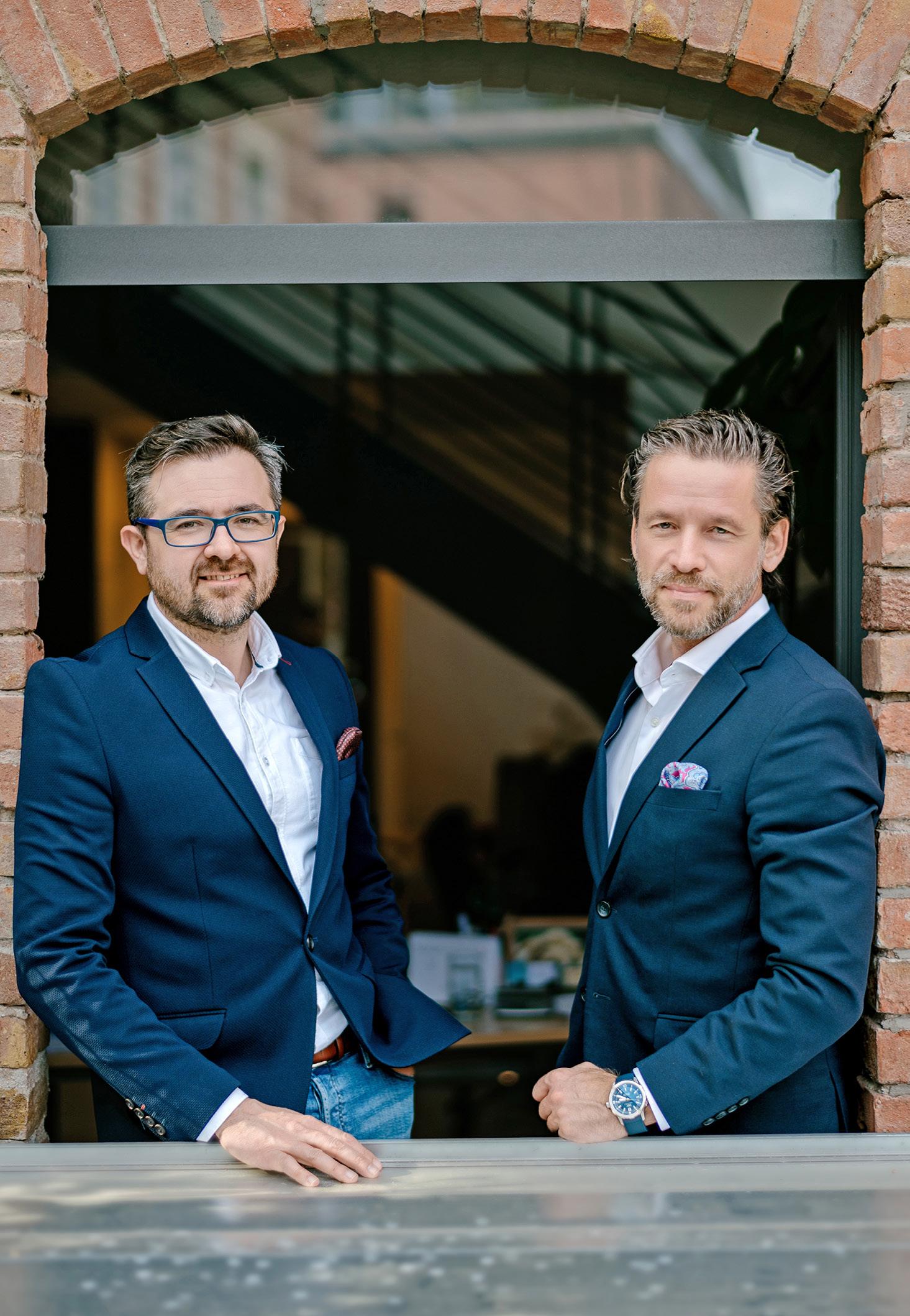
Sometimes you just have to do the legwork; there’s no way around it. Making cold calls to set up oldfashioned face-to-face meetings or driving to corporate clients in the countryside on dirt roads, if need be. György Tatár first looked up the details of would-be clients from the Budapest Business Journal ’s Book of Lists to convince them to sign his company for organizing an event.
On one of his adventurous trips in the middle of nowhere, he was greeted by an elderly lady wearing flip-flops. She was amazed by the trouble he had gone to and immediately wanted to order, albeit by sending a fax. Regardless, as a representative of a huge crane equipment company, she turned out to be a generous client.
All that seems to have happened a lifetime ago, even if the beginnings date back barely a decade. What started as a local venue search site for business events is now set to evolve into a regional behemoth.
Tatár, founder and owner of Hotel Premio Group and Hungary’s top event location search sites, never believed the myth that the market was saturated. But COVID did help.
He knew that during the pandemic, many full-time corporate event managers had been laid off. However, it was clear that once the lockdowns were over, the market would bounce back, and companies would need to organize in-person gatherings as before. Only those who knew how to handle it weren’t on the payroll any longer.
Their untested replacements who received the assignments naturally reached for the keyboard and started typing keywords into their internet search bars. And that gave Tatár’s business a tremendous boost.
It all started with cegeshelyszinek.hu, which acquired rendezvenyhelyszinek. hu, rendezveny.com and konferenciahotelek.hu, an arm of szallas.hu, Hungary’s top hotel accommodation search portal.
“We are creating an umbrella brand, but it’s all very complex, so defining it is still a work in progress,” Tatár tells the BBJ but gives a detailed explanation.
An Idea Grows
For starters, they organize events and provide all kinds of related services, from catering to entertainment, but clients can also use their service if they only need a venue for an event. The original idea was to offer local locations to local corporate buyers. However, Hungarian companies started to look beyond the borders to reward their staff with incentive trips abroad, primarily inthe CEE region.
“That’s when regional venues, typically hotels, reached out to us, asking whether we can help channel demand to them. We were more than happy to,” Tatár recalls. The result is a 2,400-plus clientele and more
than 800 domestic venues; revenues tripled year-on-year in Q1 2023.
After a while, the business reached the point where a regional expansion started to make sense.
“We realized we need to go regional. And the Czech market looked like a perfect target as it is four times as big as the Hungarian market. They spend a lot more on training and motivating staff,” Tatár explains.
The acquisition of a prestigious Czech player with more than 830 locations
has been closed and will be announced soon, so now it’s all set to offer regional sites to a regional clientele. This is an unusually large step for a Hungarian tourism business, but it’s just the start, as Poland is next on the expansion list.
Another recent twist in the business portfolio was the emergence of Mice Hungary, a platform designed to help foreign event bookers find Hungarian venue locations. (Mice is a hospitality acronym for Meetings, Incentives, Conferences, and Exhibitions.)
That move coincided with bringing in industry heavyweight Róbert Révész as partner and co-owner at Hotel Premio Group. Révész ran a significant tourism venture before joining Tatár and is a long-time friend. In an odd twist linking back to those very early days, Révész was once in charge of the sales of the Book of Lists at the BBJ, Tatár’s Bible for sourcing contact details.
Cherry on Top
“The initial scheme already involved a huge multiplicator effect. Mice Hungary is the cherry on top of tourism. Hotels also struggle to produce decent occupation rates in the spring and the fall, but that’s precisely when corporate events thrive,” Révész notes. He adds that their clientele disposes of a corporate budget that supposes higher spending and more expensive hotels.
“We realized we need to go regional. And the Czech market looked like a perfect target as it is four times as big as the Hungarian market. They spend a lot more on training and motivating staff.”
“They often return with their families, so it’s a double incentive for venues.”
Events include team building, sales-focused or education training, office Christmas parties, and product presentations. The annual total adds up to more than
1,000 bookings.
The group’s service offers far more than other search portals, the two leaders insist.
“Booking.com and the like are IT companies, whereas our service can’t be standardized,” Révész says. The complexity is due to not only personalized requests but also the dramatically shortened implementation window. “You need to get the whole event done within three weeks on average.”
If the above wasn’t enough, the group also runs a boutique hotel at Lake Balaton called Annuska, where the company holds its team-building events for its motivated staff.
“We are an experience-driven workplace where we [two leaders] have been the oldest in our midforties. Now we have hired a real adult, an accountant,” smiles Tatár. “Speaking of accounting, now we need to figure out how to build up a regional group as a Hungarian company with reporting, structure, and the like. And that’s going to be a whole new level for sure.”
1 News | 7 www.bbj.hu Budapest Business Journal | May 19 – June 1, 2023
BBJ STAFF
György Tatár and Róbert Révész (with glasses), the founder and owner and partner of Hotel Premio Group, respectively.
2 Business Working Hard to ‘Win’ With Hungary
Matt
Zeller, the country president for Novartis Hungary and
the Europe Central Cluster, was a shortlisted nominee for the Expat CEO of the Year award. We asked him about that and the plans for the company here.
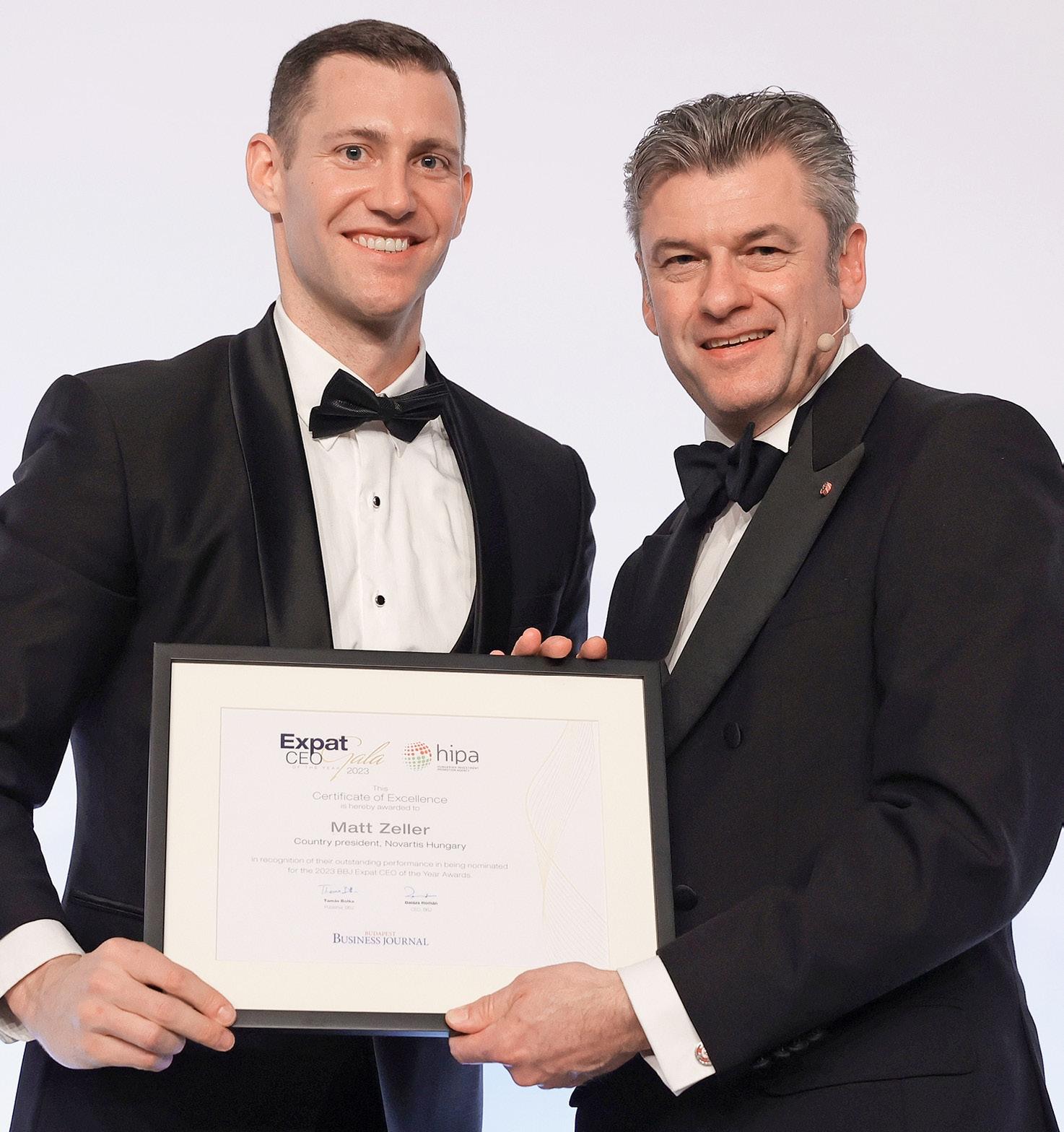
BBJ: Congratulations on being shortlisted for the Expat CEO of the Year award. What are your recollections from the evening?
Matt Zeller: What an amazing evening! The food was wonderful, the setting was elegant, people were kind and gracious. It was fun to spend the evening reconnecting with friends and starting new relationships with people who share similar passions. You could feel a tangible excitement throughout the evening that, even though there are challenges in Hungary, professionals across various sectors and companies are excited and optimistic about the future.
BBJ: What do you think the fact that you were shortlisted means to your team?
MZ: Just being shortlisted meant a great deal to me, to my family, to Novartis, and, I hope to the health sector in general. My family and I took a risk coming to Budapest, and this recognition is one symbol that the risk was worth it: that my three years here have made a positive impact on patients. Hungary is not an easy market to work in, but during my years here, I’ve met so many people who are passionate about the same goal: improving the health and lives of Hungarians. Change is possible. If we work together, I remain optimistic about the future because, in the end, nothing is more important than our health, and Hungarians need our help. I hope that my being shortlisted means that the community sees this aim as the right one, and hopefully, while I’m here, I’ve helped Hungary to make positive steps in that direction.
BBJ: You worked for the Boston Consulting Group before joining Novartis eight and a half years ago. How do you compare and contrast the role of a consultant with that of a company insider?
MZ: Working as a consultant early in my career was incredibly valuable because of the breadth of experience I was able to gain in a condensed period. I would have never been able to replicate the complexities of experience, responsibilities, and roles while working within a company. When rotating to work with a new company, region, challenge, and team every two to three months, I was constantly learning and seeing companies and problems from new angles. The pace of delivery and learning was intense and worthwhile, but after a few years, I realized I was missing seeing the actual execution of my proposed strategies and having the continuity and ability to build something for the longer term.
BBJ: What are Novartis Hungary’s plans for the remainder of 2023 and the medium term?
MZ: From a Novartis perspective, we are mostly focused on bringing our breakthrough innovations to the
Hungarian market and on helping make sure those medications are not only available but that they reach patients with unmet medical needs. From a broader sector perspective, a significant focus this year is making sure that the many medications that are waiting for national reimbursement can secure access in 2023. I know the economic and political pressure make that difficult, but this has been a key focus of my work since I got here, and I hope the “unlock” will happen in 2023.
I fully believe that investments in the latest therapies will help keep the Hungarian population active and working and position the country for long-term success.
BBJ: You briefly had a career as a professional baseball player before a career-ending ankle injury cut it short. Did you transfer a sports mentality to your business career, and if so, how is this manifested?
MZ: Two outlooks that have translated to my business career the most are: the joy of competing, and the rewarding feelings of being a part of a great team. It takes dedication, commitment, and hard work to achieve results at the highest level, both in sports and in business. I experience such joyful and prideful moments at seeing those efforts result in “wins.” Only now, when I “win,” it’s a win for my colleagues, and it’s a “win” for patients with unmet needs. There’s still a part of me that works hard to learn and improve and be the best version of myself for my career but also for my teams. At the end of the day, it doesn’t matter if you have the best products, best equipment, or best office; it’s who you work with every day and the impacts you have on one another.
BBJ: Finally, do you have a word for our Expat CEO 2023 winner, Veronika Spanarova of Citi, and the other shortlisted nominee, Andreas Szakácsi, of Claas Hungária?
MZ: It was an honor to be nominated alongside Mrs. Spanarova and Mr. Szakácsi, and it was a pleasure to spend the evening with them both. I wish them nothing but success in their fields and collectively to elevate the Hungarian market.
Regional R&D Center for Budapest
Novartis is planning to set up a new R&D center in Budapest, which will coordinate clinical research in a dozen countries around the globe. The Swiss company, which develops, manufactures, and distributes innovative medicines, has been a major player in Hungarian clinical research for decades and is one of the country’s largest investors.
“Innovation is key to building sustainable healthcare systems in Europe. With this in mind, it is a particularly exciting
opportunity for us to place greater emphasis on clinical trials in Hungary as part of our efforts to improve patient access to advanced therapies," Haseeb Ahmad, president of Novartis Europe, said. "This investment has been made possible by the Hungarian government’s ambition to make the country a leader in innovation in Europe. We look forward to continuing our partnership with Hungary and working with the country’s top researchers,” he added.
www.bbj.hu Budapest Business Journal | May 19 – June 1, 2023
ROBIN MARSHALL
Matt Zeller (left) and Robin Marshall.
Metropolitan University: Expansive Goals Create Formidable Challenges
Budapest’s Metropolitan University, with some 7,000 students, already boasts it is Hungary’s largest and most international private university; yet it aims to expand by 40%, taking the total student numbers to 10,000.
Residents of Budapest’s Zugló district have long been used to negotiating their way through gaggles of young people gathered outside the entrance to number 1-9, Nagy Lajos király útja, the main campus of Budapest Metropolitan University (Metu).
Chatting, laughing, sometimes smoking, sometimes in deep conversation, communication among these knots of youths is as likely to be English as Hungarian.
“Last semester, we had students from 130 countries [.…] When you walk around the campus, you can feel that you are not in Budapest; even the Hungarians talk to each other in English,” Péter Rada, vicerector for international affairs at Metu, tells the Budapest Business Journal

A former Fulbright Scholar who joined the university after studying in the United States for his doctorate and serving as a diplomat at the Hungarian embassy in Washington, D.C., Rada is charged with expanding the international intake, currently standing at 1,000 students, to 5,000, and bringing the total student count to 10,000.
Asked if, given that Metu’s website is in Hungarian, English and Chinese, Chinese students form one of the main target groups, Rada says that the target markets, or, as he prefers, “the partner countries,” are “a little bit broader.”
He elucidates the university’s three “international strategic goals.”
“The first is to create the global Metropolitan, global Metu, being present globally, so we will not choose [just] one target partner country.”
Indeed, currently, the percentage of Chinese students at Metu is below the average of 30% of “mobile students” worldwide, he says.
Second, Metu aims to be “the most internationally diverse university in central
Europe, [...] having students from 100 countries,” with the stress being on nations beyond European Union member states.
“We are more present in countries outside the EU. The EU members are important, but rather for exchange programs, for example, like Erasmus,” he says.
Finally, Metu should become “a model, an agenda-setter in Central Europe, through what we achieve.”
These three goals have been formulated to fulfill Metu’s ultimate objective. As the vice-rector states: “Our vision is to be the largest and most prestigious private university in Central Europe; that’s our strong vision.”
Student Sources
But how will this be achieved in practice, and where will all these additional 4,000 international students come from?
With its vast population, China is an “obvious” source for student recruitment, but Rada rattles off a string of other Asian nations with potential, including India, Pakistan and Bangladesh.
“Central Asia is booming, so Kazakhstan, Uzbekistan, [….] these countries are developing extremely quickly, including higher education, and because of the political changes, they [have] changed their direction, where they want to move,” he argues, adding that Metu has recently signed four strategic partnerships with Central Asian universities.
Then there is Africa, where the university is working hard, from Kenya in the east to Nigeria in the west.
“We are building, and this is also a new program, partnerships with all the regions in Africa. We choose a country in each region as a first step, like Nigeria in West Africa. That’s the biggest, yes, we know. They are extremely big as a sender country in terms of students, towards Europe,” he says.
This is not to forget the continent’s southern states, including Zimbabwe, where the university has built a strong presence, nor the Mediterranean region and the Middle East.
For Rada, the key to expansion is to find partner universities. “We are in the process of signing strategic partnerships with Egyptian universities. Egypt is the largest in that region, and their universities are extremely developed.”
As Rada reels off the various names, including Palestine and Israel, Georgia, the UAE and Latin American nations, it begins to feel like a mini United Nations.
“Our mission is to keep the doors open to provide opportunities to all students globally who would like to create [their own] brand, ‘my brand’ [as the university terms it]. The open-door policy for us means to provide education for those who really want it,” he says.
It is an impressive project, but can the university pull it off? Who will teach this massive influx of international students?
Rada says some 90% of lecturers are Hungarian (some 50% of courses are taught in Hungarian), but those teaching in English are carefully screened for language and teaching skills.
“The professors are trained to fulfill the requirements of the international environment, a multicultural environment, and to be able to teach in English. They are checked; they need to do exams, no matter what they had before,” he says.
Educational Standards
Then there are the students themselves: as with any for-profit educational institution, there is always tension between the recruitment staff, who, being rewarded on results, seek to boost their enrollment numbers, while the academic side is concerned that new students possess the educational standards, including English skills, fit for degree courses.
It is the job of Metu’s international admissions team to screen all prospective students, and the process is thorough, Rada insists.
“They organize interviews with prospective students, and there are several rounds. So, it’s a long process. They check the level of English, obviously, whether they will be able to follow the courses. If not, they are offered a full-year English [preparatory] program.” Moreover, students are asked for feedback on the classes to improve standards. “We listen to them,” he says.
Despite these seemingly stringent recruitment and enrollment processes, students consulted by the BBJ were mixed in their assessments.
One complained about the level of students’ English skills, particularly among some from China. “When we are put into pairs or threes to discuss questions, some of the Chinese students simply can’t contribute. They can’t speak English,” a 2022 Metu graduate told us.
Another related an incident in class when the lecturer, quizzed on his poor use of English, retorted: “The communication language of this university is bad English.”
“We are paying attention to that, so it’s changing. So, our professors, lecturers, colleagues, they are also ambassadors of the university, so they need to understand our vision and mission, and they need to work accordingly. It could have been a joke, which seemed to be harmless to the professor, [though] of course, it’s not very useful,” Rada said.
It is clear that, for some students, Metu is an overall positive experience. Rimsha Arooj, a Pakistani student about to graduate in Business Administration, and one of a gaggle outside the gate on Nagy Lajos király útja early in May, described the university as “awesome.”
“I am fully satisfied with my university. The professors are very educated, with Ph.D.s. They go an extra mile to help the students,” she said.
George Ashraf, an Egyptian in his second semester of the Business Administration course, agreed.
“It’s actually pretty good. It has a lot of internationals, actually. Also, the university is not hard; actually, it’s pretty easy. My like, expectations was very high, that it would be so hard, like in my home country, but actually, it’s not that pretty hard. That’s good, actually,” he says.
“All the teachers are very good. Some of them don’t speak the great English, but it’s good [because] I could understand from them.”
2 Business | 9 www.bbj.hu Budapest Business Journal | May 19 – June 1, 2023
KESTER EDDY
Péter Rada, vice-rector for international affairs at Metu. Photo by Árpád Kurucz.
Building a School for the Successfully Socially Responsible
On July 1, 2019, Corvinus University of Budapest became Hungary’s first foundation-run higher education establishment, and Anthony Radev became its president. The Budapest Business Journal sat down with him for a wide-ranging interview on the pressures today places on education in general and universities and students in particular. These are some of the highlights.
 ROBIN MARSHALL
ROBIN MARSHALL
BBJ: How has becoming a foundationrun university changed Corvinus?
Anthony Radev: It changed the whole philosophy. In the old system, the Minister of Higher Education took the governing body’s role over the university. You have 50-plus universities in Hungary. How is it possible that one person can effectively guide 50 different universities? It isn’t. So, the idea was to set up a dedicated board of trustees that is focused on one institution. And they have responsibility for the development and performance of that institution.
The university is not an institution in its own right: its mission goes far beyond itself. The board of trustees appoints the management – the president and the other members of the leadership team – to come up with a proposal for how to run the school. What is the proposed strategy? What are the proposed strategic initiatives? The board deal with two things: One is the long term strategy, the other is the budget, and they must approve both. So far, I think we have a solid agreement. What the leadership has proposed, the board of trustees has approved; there have been no major differences of opinion. The board of trustees and the Senate share the work to find the balance of educational and research autonomy, and the performance expectations.
Accountability and responsibilities were introduced to the system. What do we want? We want to be the best: best university, best students, best programs, best faculty, best operating environment. “Best” is a real thing. It should be better
than today. It might not be Harvard tomorrow, but this is the direction we want. And because of the model change, we now have resources. Our annual budget doubled. That’s a massive change.
BBJ: Corvinus is your almamater (back when it was Budapest University of Economics). Is that what appealed in becoming president?
AR: I retired professionally 10 years ago. I had three phases in my life. First was “learning,” then there was “earning.” When I retired, I started “returning,” giving back. There are multiple ways of giving back; I thought it very meaningful to help the next generation get a better starting position in life than I had. And, of course, your alma mater is always your alma mater
BBJ: What are the most significant challenges facing Corvinus today?
AR: Educational systems are designed to be stable. They are not designed to reflect and incorporate very quickly the changing world. They typically focus on something that can be useful for your whole life. They’re not following the news but some fundamental methodological, philosophical approach. This fast-changing world, fast-
changing technologies, fast-changing knowledge is putting a lot of pressure on education. How you raise and sustain a much higher metabolic rate in an institution not designed for a higher metabolic rate is a key challenge.
Social media is a great thing, but it poses a great challenge: how do we function as a community? As a community of people with common interests, common values, common goals, similar aspirations? Everybody wants to be successful and impactful while being socially responsible. The question is, how do all these individuals make a community to support, to inspire, to motivate each other? This way of life is different. We have various challenges about sustaining the level of community sense in our students. We have to find a way because there is a danger if you do not that you move into transactionalism. I come in for my class, and when class is over, I go away. I don’t spend time with my classmates outside of the classroom. People have a strong sense of self-identity; individual identity now has the upper hand over collective identity.
If you ask a young person, “What do I need to know about you?” they’ll start with their interests, their hobbies. Nobody will begin with “I am attending
Corvinus.” So Corvinus is not part of their identity. We want to change that. “The most important thing you need to know about me is that I go to Corvinus; I am a student of Corvinus.” I want every young person to start their introduction with this statement.”
BBJ: One complaint we hear a lot from the commercial world is that Hungarian graduates are well-versed in book learning but lack soft skills. Do you recognize that description?
AR: In the whole educational program – and it’s a century-long tradition – soft skills were never explicitly part of it. This, definitely, should change. That’s point one. But point two is, if you ask the students what their biggest complaint is, more than 60% would say it is the distance between theory and practice. We are working on that part; we try to bring people in from the practice in every course. I think what CEOs actually miss in their graduates is that they don’t understand the industry. They apply for a job, but they don’t really know how the telecommunications market works, for example. CEOs blame the universities, but there are 28 sectors in the economy. I cannot prepare people for all 28 sectors in the same depth. But we are willing to bring in people from those sectors so our students see how to apply theoretical frameworks in real life. We have more than 50,000 alumni, so we can always find somebody to come in and speak to the students for half an hour. We have 500 faculty at Corvinus, and we use 400 external speakers on a regular basis.
BBJ: What is your breakdown between international and Hungarian students?
AR: It is 80% Hungarian and 20% international. We might grow that to 25%, but the order of magnitude is about right. We want to make this school as international as possible. That does not only mean that you have international faculty; you should also have international students. Students should be able to get to know bigger and bigger portions of the world without leaving university. For me, being prepared for the world requires you to internationalize. Half of our teaching today is in English. That’s also part of internationalization.
BBJ: If you were pitching the university, what would you say? Why should someone choose Corvinus?
AR: This school is for people who want to be successful, impactful, and socially responsible. We can call social responsibility being socially sensitive, socially aware, or whatever. I call it responsible. Successful, not only because you have a great salary, but because you can actually impact the world, make somebody’s life easier and better. You provide solutions to other people’s problems. At the same time, you’re socially responsible. And if you are the person who wants to be that, Corvinus is the place for you.
10 | 2 Business www.bbj.hu Budapest Business Journal | May 19 – June 1, 2023
Anthony Radev
Hungary’s CyberShield Program Expands to Better Withstand Digital Crime
false investments using the names of celebrities to executing unauthorized bank card transactions, all aimed at causing financial harm to unsuspecting victims. He emphasized that the CyberShield collaboration could substantially enhance the vigilance of customers.
The ORFK’s proactive approach is evident in its ongoing efforts to educate the public about cybercrime. Gál described how the police are doing their utmost to warn people about the potential risks they face online.
“We are trying to raise awareness in the broadest possible way and with all the tools at our disposal to prevent people from becoming victims,” he said. The prevention-focused short films presented at the event will further support these efforts.
The banking sector, often the prime target of cybercriminals, plays a critical role in this initiative. The Hungarian Banking Association’s active participation underscores its commitment to this cause.
Kovács revealed plans for further collaboration with financial institutions and authorities to strengthen digital security, promising a robust response to the evolving digital threat landscape.
significant losses in the digital space,” the secretary general warned. He identified the weakest link in cyber defense as “the deceived person,” emphasizing the importance of strengthening the “digital immune system” to counter the rising threat.
Lieut. Col. Gál of ORFK emphasized the importance of personal responsibility in preventing cyber fraud.
The press conference announcing the expansion of the CyberShield program was held in the ballroom of the HQ of MBH Bank Nyrt. (formerly MKB Bank) on May 15. Its significance was underlined by the attendence of prominent figures from Hungary’s financial, law enforcement, and regulatory sectors, all dedicated to strengthening digital security.
These included Levente Kovács, secretary general of the Hungarian Banking Association; Csaba Kandrács, deputy governor of the National Bank of Hungary; Marcell Bíró, the president of the SZTFH; and Lieutenant Colonel Kristóf Gál, the spokesperson for the National Police Headquarters. Their collective presence highlighted the serious commitment and broad cooperation required to combat the persistent cybercrime problem effectively in Hungary.
According to Kovács, of the banking association, the frequency of digital scams in Hungary is alarming.
“Every day, a Hungarian family loses its entire savings due to cyber criminals, and every week, a Hungarian company suffers
The CyberShield program, launched in November 2022, initially united forces of the National Police Headquarters (ORFK), the Hungarian Banking Association, the Central Bank of Hungary (MNB), the National Media and Infocommunications Authority (NMHH), and the National Institute for National Cyber Defense. Later, the Ministry of Justice joined the initiative, contributing to victim support and consumer protection.
The recent entry of the SZTFH into the initiative expands its scope further. SZTFH president Bíró highlighted the staggering financial impact of digital fraud, “66% of companies were victims of fraud, paying more than HUF 250 million to fraudsters, while recovery costs exceeded HUF 500 million in the first two months of last year.”
Banking Collaboration
Ferenc Kardos, CEO of the Media Union Foundation, outlined the collaboration with the Hungarian Banking Association. “The banking association was successful in responding to the Media Union Foundation’s call, which now enables us to use advertising platforms to disseminate the most important cybersecurity messages.”
He elaborated on the timeline and focus of the campaign. “The initiative, which kicked off in May 2023 and will run until the first quarter of 2024, is designed to draw attention to the perils of cyberspace, with a particular emphasis on financial and data protection threats.”
“We strive to alert the public in the broadest possible manner about the importance of not becoming victims. People must exercise caution and refrain from sharing personal or banking information over the phone, via SMS or email,” he said. To make this information more accessible, ORFK also takes a creative approach.
“At the [launch] event, we premiered short films designed to highlight the most common methods of online fraud in a way that is easy for the general public to understand and remember.”
The Hungarian Parliament voted recently to establish a cybersecurity certification framework, marking a significant leap in Hungary’s journey towards a more secure digital landscape. Bíró clarified that this system “will ensure that the SZTFH sets cybersecurity expectations and requirements for ICT products and services (excluding the military industry), evaluates their compliance, and promotes the market use of products that meet cybersecurity aspects.”
In response to a question from an MTI journalist, Kovács shared plans for additional collaborations with financial institutions and authorities to enhance digital security further. The expansion of the CyberShield program signals an increased commitment to ensuring a safe digital landscape for Hungarian citizens and companies alike, and a stronger stand against the digital crime wave.
Alarming Increases
Online fraud has increased alarmingly, with digital spaces providing fertile ground for criminals. Kandrács noted the diverse tactics employed by these fraudsters, from promising
The diverse collaboration reflected in the CyberShield program, from law enforcement and financial institutions to regulatory authorities, is a testament to Hungary’s collective resolve to combat cybercrime, the participants argued.

As more entities like SZTFH join the initiative, the country will be able to present a more unified and robust front against the growing menace of digital fraud. This coordinated approach, proactive educational campaigns, and stricter cybersecurity requirements are crucial to safeguarding the financial and personal information of Hungarian citizens and companies.
The expansion of the CyberShield program comes at a critical time, with digital fraud reaching unprecedented levels in Hungary. The joint efforts of key national institutions and proactive measures to raise awareness and resolve disputes promise a more robust defense.
As Hungary continues to navigate the digital age, the importance of such initiatives in ensuring a safer cyber environment cannot be overstated. The nation’s digital future hinges on the success of such programs in fortifying the “digital immune system” of its citizens and businesses alike.
2 Business | 11 www.bbj.hu Budapest Business Journal | May 19 – June 1, 2023
GERGELY HERPAI
As digital fraud cases surge across Hungary, the nation’s CyberShield program, designed to curb online scams, has been given a significant boost. The national Supervisory Authority for Regulatory Affairs (SZTFH) has joined the initiative, fortifying the defenses against cybercrime and enhancing digital security awareness nationwide.
“Every day, a Hungarian family loses its entire savings due to cyber criminals, and every week, a Hungarian company suffers significant losses in the digital space.”
From left: Ferenc Kardos, Media Union Foundation; Levente Kovács, Hungarian Banking Association; Marcell Bíró, Supervisory Authority for Regulatory Affairs; Lieut. Col. Gál Kristóf, National Police Headquarters.
U.S. Government Default not the Scariest Thing in the ‘Jungle’

Finance Matters
Finance Matters
A biweekly look at financial issues in Hungary and the region
(b) Higher interest costs. With longterm government debt gradually rolling over and refinancing at ever higher rates and new debt being raised to fund the deficit, interest costs are increasing rapidly. Interest expenses increased from USD 329 bln to USD 828 bln between May 2013 and December 2022, respectively. With the compounding effect of interest on interest, interest expenses could soon become the single largest expense item on the U.S. budget.
U.S. Government debt has already surpassed the legislated debt ceiling of USD 31.4 trillion, with the Treasury relying on “extraordinary measures” to stave off default. U.S. Secretary of the Treasury Janet Yellen stated that a default could happen as soon as early June, at which time the government could run out of cash to fund day-to-day operations.
Financial markets seem to blithely ignore the risk, figuring that, as the debt ceiling was raised 29 times over the last 45 years, 2023 will be no exception. But the political divide is greater than ever.
Few people are aware of the damage a default might cause. It would almost certainly unleash a significant recession and a big rise in interest rates to compensate for higher risk (and not just on U.S. Government debt). The U.S. Congressional Budget Office recently offered the following impact assessment of default for America.
We are already paying the price of brinkmanship. And the problem could get much worse very quickly.
From the above, one would think that the default is THE big issue that will determine our financial future. I would argue there are much bigger issues.
Bestselling author Stephen Covey once wrote, “We’re often so busy cutting through the undergrowth, we don’t even realize we are in the wrong jungle.”
“Wrong jungle” is the perfect phrase to describe the tempest surrounding a default caused by a failure to raise the debt limit. The fact that there is such a massive debt in the first place and that it is increasing so quickly is a much bigger issue. Let me give you some more context on why this is the wrong jungle.
1) De facto, the debt ceiling does nothing to curtail debt: The debt ceiling is an artificial construct. The U.S. Congress legislates it, and it has been reset so many times it has no credibility as a limit to indebtedness. It has done little or nothing to keep government debt from going out of control other than providing
an opportunity for horse trading between politicians as a precondition for raising the limit each time.
2) U.S. Government spending going off the rails is a much bigger issue than the level of debt itself: Debt levels need to be addressed by reducing spending, not capping debt. The U.S. deficit is currently in the range of 4-5% of GDP, but it is likely to increase to 6-7% due mainly to:
(a) Unfunded U.S. Government liabilities. These now exceed USD 123 billion, roughly quadruple the level of U.S. national debt, more than USD 900,000 per U.S. household. These reflect the inadequate levels of money being set aside to fund future Medicare, social security, and the like. These will dictate deficit increases and, at some point, tax increases.
3) The debt overhang will be with us long after the debt ceiling crisis is over: There is so much drama and media attention surrounding the debt ceiling. In my humble opinion, this detracts attention from the real issues (deficit spending and national debts careening out of control), which makes the “wrong jungle” aphorism particularly apt.
A much better solution than the debt ceiling would be the “debt brake” enshrined in the Swiss constitution: Swiss Government receipts and expenditures must be balanced over the long term. Surpluses must be generated during a boom to pay for deficits during a recession. It has helped them trim the national debt to below 30% of GDP.
The chart above shows the extremely negative impact of a default. Yet the disruption from a full-blown debt crisis could be much greater. The world can ill afford such a crisis. It’s typically the proverbial man on the street and the poor who pay the price.
But the “price” will reverberate at multiple levels. For example, if the world economy were to decline by 8-10
or more
percent, this would also impact our ability to combat global warming as well as potentially affect the balance of power between the United States and China. The higher debt levels go, the more systemic risk in our financial system. The stakes of not addressing excess deficit spending and government debt are simply too high to ignore.
Les Nemethy is CEO of EuroPhoenix Financial Advisers Ltd. (www.europhoenix.com), a Central European corporate finance firm. He is a former World Banker, author of Business Exit Planning (www. businessexitplanningbook.com), and a previous president of the American Chamber of Commerce in Hungary.
12 | 2 Business www.bbj.hu Budapest Business Journal | May 19 – June 1, 2023
columnist Les Nemethy looks at the threat of the United States defaulting on its debt and the more significant dangers he believes lie hidden beneath that.
Q3 2023 Brinkmanship Short Default Protracted Default Jobs (millions) -0.2 -0.5 -8.3 Real GDP (% annualized growth) -0.3 -0.6 -6.1 Unemployment (percentage points) +0.1 +0.3 +5.0 Source:
Graphic
by Rawpixel.com / Shutterstock.com Estimated Effects of a Debt Ceiling Standoff,
Council of Economic Advisers (CEA) analysis
Hungarians Need More Self-care, Allianz Survey Reveals
Looking to explore the topic of selfcare and the results from its survey in a more interactive way, Allianz Hungária hosted a roundtable discussion with experts on May 10 at Déryné Bistro, a well-known café and bakery on the Buda side of the city.

The friendly staff and cozy atmosphere at the bistro, a local favorite since 1914, greeted the participants, who included journalists and bloggers interested in self-care and financial literacy
The roundtable featured four speakers: Levente Vámos, head of sales, and Tamás Bencsik, head of personal insurance, both from Allianz Hungária Zrt., Péter Gergely, the founder of and a financial expert at BiztosDöntés.hu, and Dr. Kitti Almási, a clinical psychologist.
The speakers shared their insights and experiences on self-care, such as savings, investing, budgeting, health, and wellness. They also answered questions from the audience and engaged in a lively dialogue.
The event was part of Allianz Hungária’s “Start Making Cents” (Az öngondoskodó) program, which aims to raise awareness and knowledge about self-care and financial literacy. The campaign also features online videos and
podcasts that provide helpful tips and insights on self-care topics.
The Allianz Hungária survey was conducted across 10 countries in Central and Eastern Europe and revealed that Hungarians have low savings, investments, and insurance coverage for their future needs.
According to the survey, only 28% of Hungarians have some form of pension savings, compared to 54% in Poland and 67% in Romania. Moreover, only 17% of Hungarians have health insurance, while the regional average is 34%.
Lacking Knowledge
The survey also showed that Hungarians are less aware of the risks and challenges they may face in their old age, such as inflation, longevity, and healthcare costs. Only 38% of Hungarians said they have a clear idea of how much money they will need for retirement, while 52% said they do not know how to calculate it.
The survey also found that Hungarians have low confidence in state-run systems in this field. Only 19% of Hungarians said they trust the public pension system, while 31% trust the public healthcare system. Those figures are well below the regional averages of 37% and 45%, respectively.
The survey results indicate that Hungarians need to take more responsibility for their own well-being and financial security, according to Allianz Hungária.
The insurance company said that self-care is not only about physical and
mental health but also about financial planning and protection. It added that financial literacy and education are essential for making informed decisions and achieving financial goals.
Allianz Hungária also highlighted the role of insurance products and services in providing customers with peace of mind and stability. The company said it offers a wide range of solutions for different life situations and needs, such as life, health, pension, home, and auto insurance.
The company added that it supports various initiatives and programs to improve Hungarians’ financial literacy and self-care. For example, it sponsors the Money Week program, which educates students on financial topics. It also organizes workshops and webinars for its customers and partners dealing with self-care.
Vámos, head of sales at Allianz Hungária, stressed: “We believe that self-care is one of the most important values in life. We want to help our customers achieve their goals and dreams by providing them with comprehensive solutions and professional advice.”
Expectation and Reality Gap
Bencsik, the head of personal insurance, added, “We see a huge gap between the expectations and reality of our customers regarding their future wellbeing. We want to close this gap by raising awareness and offering products and services that meet their needs.”
To that end, the “Start Making Cents” campaign features online videos and podcasts that provide tips and insights on self-care-related topics, such as saving, investing, budgeting, health and wellness.
It also invites customers to share their stories and experiences on how they practice self-care and what motivates them. The best stories will be rewarded with prizes such as vouchers, books and gadgets. Lastly, the campaign aims to inspire and empower customers to take charge of their future happiness. As the slogan says: “Self-care is not selfish. It’s smart.”
Gergely of BiztosDöntés.hu noted: “Self-care is not only about taking care of ourselves physically and mentally but also about taking care of our finances. We must learn to save money, invest wisely and protect ourselves from unforeseen events.”
Almási observed that “Self-care is not a luxury, but a necessity. It is a way of respecting ourselves and our needs. It is also a way of coping with stress and challenges in life.”
Despite the low levels of self-care among Hungarians, Allianz Hungária expects positive trends in the future.
According to the firm, it has seen increased demand for its products and services related to self-care in recent years. For example, it has sold more than
100,000 life insurance policies since 2018. Its health insurance portfolio has also grown, especially among young customers.
The company expects the COVID19 pandemic to have a lasting impact on the attitudes and behaviors of Hungarians toward self-care. Allianz Hungária said that the pandemic had highlighted the importance of health protection and financial resilience. The firm says it hopes that more Hungarians will realize the benefits of self-care and take action to improve their well-being and financial security.
2 Business | 13 www.bbj.hu Budapest Business Journal | May 19 – June 1, 2023
Hungarians are among the least prepared for retirement and healthcare costs in the region, according to a recent survey by Allianz Hungária. The study also showed that Hungarians are less aware of the risks and challenges they may face in their old age, such as inflation and longevity.
GERGELY HERPAI
From left: Tamás Bencsik and Levente Vámos of Allianz Hungária Zrt., Dr. Kitti Almási, clinical psychologist, and Péter Gergely, of BiztosDöntés.hu
3 Special Report
Automotive Industry
The One-way Street of Continuous Self-Reinvention
As automotive whooshes semisilently toward an electric future, stakeholders must keep pace with constantly changing market conditions and regulations. A roundup by the Hungarian Investment Promotion Agency reveals how investors adjust their strategies to these circumstances and what awaits suppliers down the road.
Nowadays, automotive stakeholders are not in an enviable position. The chip shortage may no longer make headlines, and the worst days of the energy crisis are perhaps over. However, day-today operations are still shaped by the trinity of sustainability, profitability, and competitiveness, aspects that are far from easy to reconcile.
Yet, things look rosy in Hungary. The sector’s production value has soared by a factor of 3.5 in the past decade, passing the HUF 10 trillion mark for the first time last year. In fact, the 2022 figures represent a record HUF 12.2 tln, equivalent to a 30% year-on-year growth. Competitiveness benchmarks are also positive; 90% of domestic production was exported to 173 countries. Meanwhile, foreign direct investment has seen exceptional activity too. The construction of BMW’s state-of-the-art iFactory in Debrecen is underway, and Mercedes-Benz’ EUR 1 billion development continues apace, to name but two of the largest-scale projects by original equipment manufacturers in Hungary. The transition to electrification is what primarily drives current automotive
investments, as OEMs are gearing up for a change made inevitable by evolving regulation. They are not only ramping up in-house capacities and competencies but also striving to persuade suppliers to set up shop in close proximity.
Take the aforementioned BMW and Mercedes-Benz. Both have announced they will set up their own battery assembly plants; Mercedes will purchase batteries from CATL’s gigafactory to be built in Debrecen, whereas BMW plans to rely on EVE Power’s EUR 1 bln battery plant scheduled to be up and running literally next door in 2026.
More investor news from earlier this year provides further evidence that the industry is in e-mode: The German Boysen Group, traditionally better known as a specialist in exhaust technology, announced it would set up a battery casings plant for EUR 150 million, Korea’s EcoPro BM has broken ground on a EUR 728 mln cathode material factory, and Sang-A Frontec, also from Korea, will invest EUR 25 mln to make plastic battery parts.
Record Breaker
Hipa closed 51 deals between 2016 and Q1 2023 in the e-batteries field worth some EUR 10 bln and creating 15,000 new jobs. This doesn’t even include CATL’s above-mentioned gigafactory, a EUR 7.3 bln project, which is an absolute record in the history of Hungarian investment promotion to date.
As Minister of Foreign Affairs and Trade Péter Szijjártó said at the 2023 Hipa Automotive Conference, being the meeting point of East and West is what makes Hungary essential as the success of the European economy depends to a large extent on how fast and well European automotive can handle the transition.
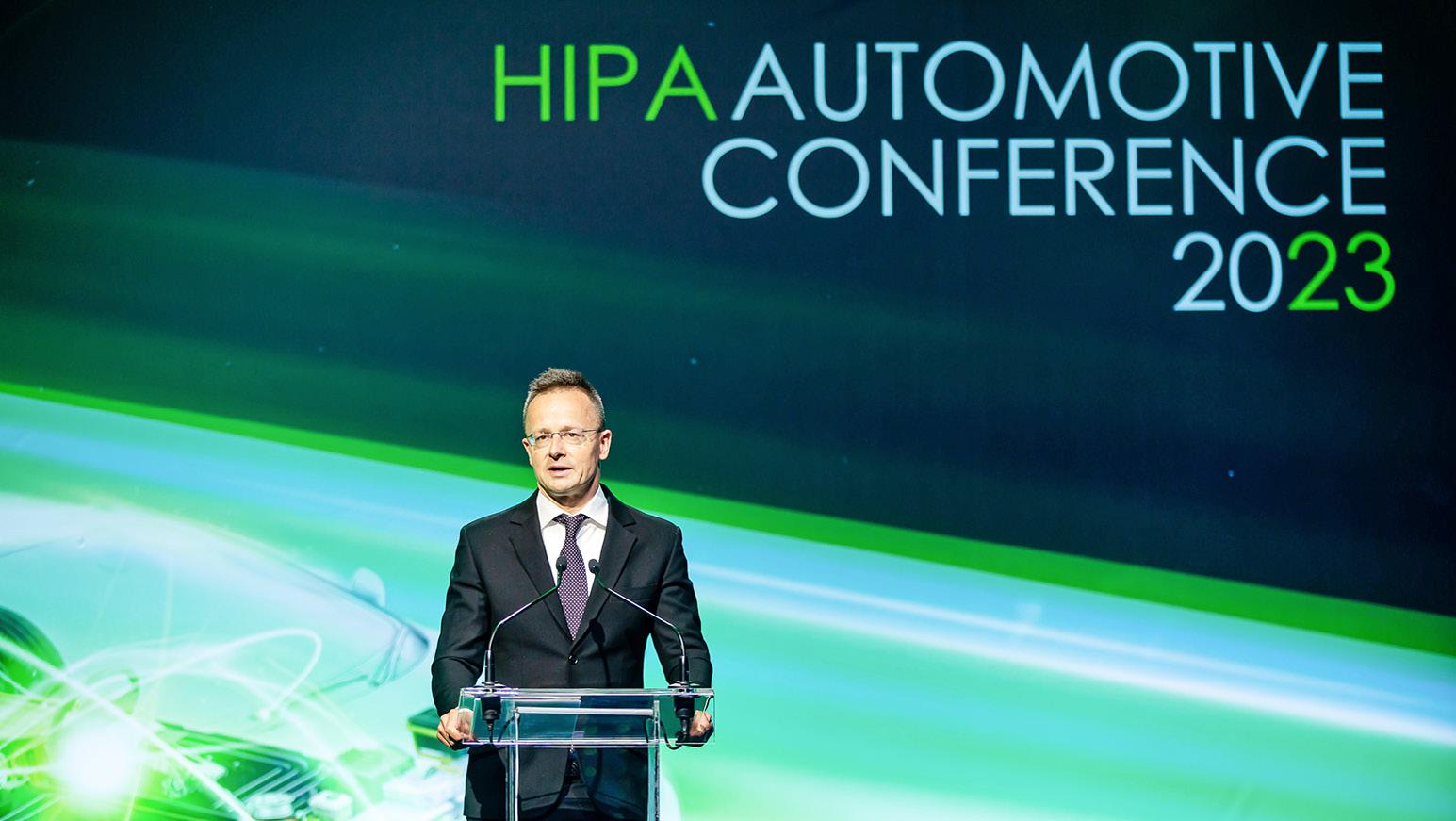
Hungary’s government is ready to give a helping hand to stakeholders that invest here. Renewable energy-related investments and energy efficiency developments are eligible for government subsidies that cover up to 50% of costs. Another tool included in the Hungarian investment promotion regime is that investments of up to
EUR 350 mln
will be exempt from European Commission approval if they are designed to cut carbon emissions and certain further terms are met in line with the new initiative. Automotive players can surely use such supportive measures, as the transition away from fossil fuels puts an immense burden on them. Whopping energy bills, galloping wages, and the aftermath of the chip shortage make their lives hard enough. What really tests their ability to adapt, though, is how they go from an internal combustion engine (ICE)-based business strategy to electric powertrains at such short notice.
Japanese-owned Denso feels that pressure too. The company has been present in Hungary since 1997 and specializes, among other things, in manufacturing power transmission, electronics and safety systems. As Attila Szincsák, vice president of Denso Manufacturing Hungary Kft., explains, the next 5-10 years will be most critical when it comes to planning. One of the issues that is triggered by the transition is capacity.
“OEMs don’t want us to stop producing items for ICEs, and whenever we would like to do so, they get into panic mode and sign long-term contracts thru 2030 or later to ensure capacity,” he notes. This, in turn, prevents suppliers like Denso from freeing up resources for electrification-bound activities.
Capacity Challenges
Another problem is that, although there is still time until the 2035 ban on new ICE engines, it’s impossible to find partners for ICE-bound investments on any scale in Europe. But since you can’t increase capacities without those investments, EU-based firms are missing out on business opportunities as volumes can’t be maintained.
Szincsák was pleased by a last-minute exception that has left the door open for selling vehicles running on e-fuels after
as he says there are some excellent alternative solutions out there. Their development shouldn’t be brought to a halt just because of the EV revolution, he argues.
He voices further concerns regarding the high speed of transition and the lack of related impact assessments.
“Manufacturing becomes more simple when it comes to EVs, and as a result, seven out of ten suppliers will disappear,” he explains. “ICE suppliers are in grave danger if they don’t start preparing for the transition together with OEMs.”
In fact, in Germany, local suppliers are in trouble in growing numbers partly because they were late to realize what was coming and partly because Eastern newcomers are highly competitive. As OEMs want to keep many tasks in-house to retain their workforce, this makes the situation of the players of the value chain even more difficult.
“Who said that ICE is the bad boy? It is – and will be – very much needed in areas where an e-battery is not an option,” Szincsák adds. He notes that Hipa’s support is crucial in the process of gearing up for transition. In fact, Denso will unveil a new Hipa-guided investment in a few weeks that will help Denso take a crucial step in prevailing in an electric-only automotive future.
www.bbj.hu Budapest Business Journal | May 19 – June 1, 2023
2035,
BBJ STAFF
PRESENTED CONTENT
“Manufacturing becomes more simple when it comes to EVs, and as a result, seven out of ten suppliers will disappear,” he explains. “ICE suppliers are in grave danger if they don’t start preparing for the transition together with OEMs.”
Minister of Foreign Affairs and Trade Péter Szijjártó, addresses the recent Hipa Automotive Conference.
Continental’s Hungarian R&D Hubs Drive Cars Towards Safer Future Automotive Matters
A monthly look at automotive issues in Hungary and the region
Continental Hungary is at the forefront of efforts to make driving safer, with several operations nationwide offering artificial intelligencefueled software and technological solutions and developments for sensors and brake systems. The company tells the Budapest Business Journal about the state-of-the-art solutions its Hungarian hubs are putting out, contributing to the future of autonomous vehicles and safer driving in general.
The Hungarian capital, indeed, the whole country, has long been hailed as a good location in the region for technological development. For this reason, Hungary has become a center for automotive companies in developing and manufacturing solutions for the industry. Based in Budapest, Continental’s Artificial Intelligence Development Center is developing next-generation automotive software solutions to make automated driving safe and affordable.
“Budapest is a good location for an AI development center given the considerable local academic research, a well-developed AI community, and several start-ups. For that very reason, Continental Autonomous Mobility Hungary, with the Artificial Intelligence Development Center, is based in Budapest,” Continental tells the BBJ
The capital itself is an attractive metropolis, a suitable work location for global information technology experts “thanks to its reasonably-priced yet good-quality living conditions and its proximity to other European countries,” the firm adds.
Beyond the borders of the capital, Continental Autonomous Mobility Hungary has operations in two
of the leading provincial cities: Debrecen (232 km east of Budapest by road) and Szeged (some 175 km to the southeast). Both locations opened in
2022,
as Continental wanted to be close to the vibrant local software engineer professional community and the highquality local university education available in each city.
“Our teams at Continental Autonomous Mobility Hungary have accumulated extensive knowledge in artificial intelligence. Along with so many important professional fields, like embedded development, data management, and infrastructure development, we work together to support the development of AI- and software-based solutions in Continental Autonomous Mobility business area,” the company says.
Vesprém R&D
In the research and development hub in Veszprém, some 115 km southwest of the capital, Continental develops and manufactures intelligent battery sensors, chassis position sensors, wheel speed sensors, and engine and transmission sensors.
“Generally speaking, we develop for a global market, so collaboration with other locations is almost always necessary, and it is very beneficial for the learning opportunities of our colleagues. We have a major role in the FPS [Future Break System] 2 semi-dry brake system, which is coming to the market for the first time. This will be developed by us in Hungary,” Continental adds.
With the adoption of OpenAI’s Generative Pre-trained Transformer
(GPT) multimodal large language model in the form of Chat GPT, both the business community and the general public have recently lifted artificial intelligence into public dialogue to an extent never seen before.
However, AI solutions have been around in almost every industry for a while, even if under the hood. AI has already made vehicles much more reliable and safer in the last decade, and this trend continues with advanced driver-assistance systems (ADAS). This technology is becoming mainstream and more affordable.
“Nowadays, AI is used to understand and model the environment around vehicles with superhuman precision and detail, making even more automated systems possible, like automated garage parking, highway pilots or even fully autonomous systems like truck service,” Continental explains.

People’s relationships with their cars are changing. Autos are being shaped by new possibilities with AI, such as augmented reality-based head-up displays, interior monitoring that reminds people when they leave their child or a valuable object behind, and smoother conversational AI systems running navigation or entertainment systems in vehicles. In the case of the most recent technology Continental is working on, these systems can notify owners if the car’s environment is becoming hostile, for example, too hot fora child waiting in the vehicle.
Ambitious Goal
One of Continental’s objectives, Vision Zero, placed an ambitious goal in its crosshairs. The aim is to eliminate fatal accidents
happening every day on the roads. The automotive giant works with creative, passionate minds willing to shape the future of driving by delivering perception and fusion systems to aid unmanned driving.
“Our long-term goal, Vision Zero, envisions a world without traffic accidents, and it is an ongoing process. All the technologies we introduce to the roads are designed to minimize driver distraction and provide the most accurate environmental perception possible. Safety is non-negotiable for us, and saving lives is our primary dedication,” the firm adds.
Continental says its safety solutions meet the needs of customers and aim to provide industry-leading solutions for a sustainable world.
and model the environment around vehicles with superhuman precision and detail, making even more automated systems possible, like automated garage parking, highway pilots or even fully autonomous systems like truck service.”
“With each safer solution we introduce to the roads, we are one step closer to achieving Vision Zero, day by day,” it insists.
With increased digitalization, however, comes the threat of security breaches. Experts have been working on safeguards to ensure these connected applications do not allow hackers to take over cars and remotely control them without owners’ consent. In June
2020,
the United Nations Economic Commission for Europe passed UNECE R155, a resolution calling on automakers to implement measures to prevent, detect and respond to attacks throughout a vehicle’s lifetime.
“Therefore, there is no connected mobility without the right security approach: Continental, together with Elektrobit and Argus Cyber Security, offer multilayered, end-to-end solutions to ensure maximum cyber security for vehicles throughout their service life along the lines ‘Prevent, Understand, Respond.’ All our solutions enable our customers to fulfill the requirements of the UNECE regulation, which calls for security monitoring, and more,” Continental argues.
3 Special Report | 15 www.bbj.hu Budapest Business Journal | May 19 – June 1, 2023
BBJ STAFF
Illustrative photo by metamorworks / Shutterstock.com
“Nowadays, AI is used to understand
GreenTech Returns to ZalaZone for 4th Time to Talk Energy Matters
Sustainability
conference GreenTech will hold its fourth annual conference on May 25-26. Returning to Hungary’s ZalaZone Vehicle Test Track, the expo advocating environmental awareness and more sustainable business has grown in the past three years and is eying further expansion.
Over the years, the forum has welcomed six ministers, six state secretaries, 60 institutional and corporate expert speakers, 200 exhibitors, and 1,000 attendees and shipped 2,000 local students to the event for free from nearby localities.
At the start, however, success was far from certain. The first GreenTech event opened in the shadow of the approaching first wave of the coronavirus pandemic in 2020.
“We were in the midst of uncertainty and restrictions. Despite this, the event received a lot of interest, both from participants in person and online,” Károly Kovács, project manager of the Zalaegerszeg Green Energy and Sustainability Exhibition and Conference, recalls for the Budapest Business Journal
“The immense positive feedback from our partners after the first event suggested we expand our conference both in areas covered and area of footfall to accommodate participants,” he adds. That foresight to grow scope was well founded. Last year, the conference received so much interest that the organizers could not fit everyone in.
“Professional areas and related industries in the focus of the event have expanded the fastest. As organizers, we make an effort to be as forwardlooking as possible to meet expectations towards GreenTech,” Kovács explains.

Given the energy crisis that Hungary and the continent face, the event’s main discussion topics are timely and crucial. Hungary needs an energy strategy that simultaneously serves supply security, EU climate policy goals and economic competitiveness.
The three main pillars to be implemented are increasing the share of green energy in the country’s overall domestic mix, improving energy efficiency, and addressing energy savings.
“Currently, nuclear energy accounts for about 50%, and fossil fuel-based energy accounts for about 37% of the domestic energy mix. Renewables make up approximately
14.7%.
The Hungarian government has pledged to increase the share of renewables to 21% by 2030,” Kovács said. However, energy pundits have called for more green energy sources.
The Hydrogen Question
Hydrogen is often seen as one alternative. The potential of the most abundant chemical substance in our universe represents a significant portion of GreenTech’s program, with standalone presentations and roundtable discussions to explore the possibilities of the technology.
“The Hungarian Government agrees that hydrogen should be one of the future key technologies of sustainable energy systems. Experts predict that this will be reflected in the modification of the country’s National Energy Strategy. In fact, Hungary already has its own independent hydrogen strategy,” Kovács says.
But hydrogen is expensive to produce and even costlier to transform into a form that is safe and easy to
transport, as it is highly flammable. The technology must develop before it can be considered a price-effective and safe green alternative.
“Since hydrogen is not currently available to alleviate the energy crisis in Hungary, the technology is expected to become widely used only after
2030,
but possibly before 2040,” Kovács says.
Northern and Western European countries are further ahead in developing promising hydrogen technology, while the Southern and Eastern European regions lag. The substance is also seen as a potential alternative fuel for our roads.
“An increasingly strong group of supporters have appeared for hydrogen propulsion in vehicles, with Toyota being one of the most important players. Furthermore, research and development in hybrid and mild hybrid propulsion vehicles are also becoming more significant,” Kovács points out.
When they first appeared in this century, electric cars were often considered a costlier alternative on upfront investment but cheaper to run than conventional vehicles powered by an internal combustion engine. The energy crisis has put a dent in this perception.
With energy prices hiked and the government’s utility price cap only applying to average domestic use, it has become more expensive to buy and service electric autos than their fossil fuel-powered peers. Running an EV today is almost as costly as an ICE car. “As of now, electric car prices are definitely a barrier in their adoption rate, and the continuously increasing charging costs are also an issue,” Kovács accepts.
Costs Must Come Down
Like hydrogen, the technology around EVs must become cheaper to offer a viable green alternative. The energy for charging these cars must also be sourced from sustainable operations, or the switch is meaningless.
“Chinese brands developing electric cars and car parts, which are significantly more affordable than their European peers, are appearing in increasing numbers in Europe,” Kovács notes. Electric auto experts have for years expected Chinese makers to consolidate prices and boost the technology.
Political and public discourse tends to be overheated regarding the Paks nuclear plant and the planned Paks 2 extension, which is now much delayed. The original contracts were signed nine years ago, and as delivery lags, they have needed to be modified after Russia’s war in Ukraine contributed to the current energy crisis and caused disruption to supply chains.
“These certainly contribute to the current delay. It must also be remembered that there are about 6,000 permits required to put such a facility into operation, which can also increase the time frame,” Kovács says.
While the Hungarian government’s officially confidential dealings with Russia on expanding the Paks power plant is a topic of debate across the region’s political spectrum, nuclear power as an energy source globally stirs the waters from a technical point of view.
Many experts consider nuclear the “greenest” source regarding costeffectiveness and energy efficiency. But storing waste accumulated as the energy is created will need to be tackled by those that follow us.
“The storage of radioactive waste certainly requires a long-term solution and will present significant challenges for future generations in terms of both economic and technological points of view. Currently, most countries use interim storage facilities, but it is urgent to build deep geological repositories as soon as possible to store these dangerous chemicals safely,” Kovács warns.
Today’s market sentiment suggests that, from Hungary’s perspective, completely replacing nuclear energy in the national energy mix is not a realistic option in the medium or long term.
“In addition to further use of nuclear energy, the greenest, best option would be to increase the proportion of green energy sources, reduce the proportion of fossil energy carriers, and produce and use them with as little environmental impact as possible,” Kovács concludes.
16 | 3 Special Report www.bbj.hu Budapest Business Journal | May 19 – June 1, 2023
BBJ STAFF
The patrons of this year’s GreenTech conference include Minister of Energy Csaba Lantos and Zalaegerszeg Mayor Zoltán Balaicz. The opening speech is to be given by Minister of Regional Development Tibor Navracsics.
Károly Kovács, project manager of the Zalaegerszeg Green Energy and Sustainability Exhibition and Conference.
Eve Power Investing HUF 400 bln in Debrecen Plant

China’s Eve Power, the ninth-biggest battery maker in the world, will invest around HUF 400 billion in its first plant in Europe, in Debrecen (225 km east of Budapest), Minister of Foreign Affairs and Trade Péter Szijjártó announced on May 9, according to hvg.hu. The state is providing HUF 14 bln to support the investment, which will create around 1,000 jobs, Szijjártó said. He added that German automaker BMW had asked Eve Power to supply a car plant it is building in Debrecen with next-generation batteries from a local production facility. Projecting a 10-fold increase in demand for electric vehicles by 2030, Szijjártó said a country that can attract EV battery production investments “gets a long-term guarantee the economy will grow. The German-Chinese cooperation taking place here clearly shows how much better connectivity is for the world than forming blocs,” the foreign minister added.
Győr and Seoul Unis Cooperating
The Automotive Research Center of István Széchenyi University has concluded a cooperation agreement with the Institute of Urban Planning of the University of Seoul, so joint research, publications, and exchange visits can help their further development in the future, according to the higher education institution in Győr (120 km northwest of Budapest) writes profitline.hu. At a meeting before the signing of the agreement, Chancellor Ferenc Friedler, the academic vice president, emphasized that the University of Győr is Hungary’s outstanding higher education institution in research, organizational functioning, financial resources and infrastructure.
Automotive Industry Output up 23.5% in March
The output of the automotive industry, Hungary’s most significant manufacturing sector, rose 23.5% year-on-year in March, according to a detailed data release by the Central
Magna International Building HUF 19 bln Plant
Canadian automotive parts maker Magna International is building a HUF 19 billion plant in Vecsés (25 km southeast of Budapest), Minister of Foreign Affairs and Trade Péter Szijjártó said on May 11, according to autopro.hu. The plant will supply parts to German car maker Mercedes-Benz’ base in Kecskemet (95 km southeast of Budapest) and peer BMW ’s factory in Debrecen (225 km east), Szijjártó said. He added that the government is supporting the investment, which will create 300 jobs, with HUF 3.8 bln in funding.
Statistical Office (KSH) on Friday. Growth of the segment, which accounted for 26% of manufacturing output, picked up from 7.2% in the previous month. The detailed data shows the output of the electrical equipment segment, which made up 11% of manufacturing production, climbed 23.1% year-on-year
Finding the Balance in a Developing Market
You don’t have to be a real estate expert to appreciate how far and fast the automotive and e-mobility sectors are driving the Hungarian economy. According to the latest Commercial Real Estate Market Report from the National Bank of Hungary, the automotive industry had expanded by 20.3% in January 2023 on a year-on-year basis, while the manufacture of electrical equipment, including batteries and electric motors, rose by 43.5%.
ROBIN MARSHALL
Balázs Czifra, who, as director of sales, asset management, and business development at the privately held Hungarian real estate developer InfoGroup, is a real estate expert, says some critical trends are apparent.

While, in many cases, the factories of the component suppliers are not yet operational in the immediate vicinity of manufacturing centers such as BMW’s so-called iFactory at Debrecen
(itself not complete), attention is already beginning to move further afield. Not that there isn’t still an awful lot to do.
The fully operational date for many projects on the market now is mid2025, but that means test operations must have begun half a year or even nine months earlier, Czifra says. These critical component suppliers will provide parts, and just-intime processes mean delivery from supplier to automaker can often be measured in minutes.
“If there’s any trouble in the whole process, they have surplus end products for about 30 minutes only, which means that continuous production must be maintained in all facilities; that’s the biggest challenge for us, who also manage the building,” the director says. “This is a completely different world. There cannot even be a 10-minute cut in the electricity supply because these deadlines are so tight. But of course, we are up for the challenge.”
But even as this first phase moves forward, some eyes are looking, metaphorically and literally, further down the road. If manufacturing capabilities characterize the initial stage, the next will be built around logistics.
Decisive Development
“That is going to be, I think, quite decisive,” Czifra says, though he admits there are still plenty of open questions. “It is not entirely clear how they can manage the distance from a factory, what type of warehousing, what type of additional items they will need
Christian Badergruber, managing director of Magna Hungary Kft., speaks at the press conference at the Ministry of Foreign Affairs and Trade on May 11, announcing the investment by Canada’s Magna International.
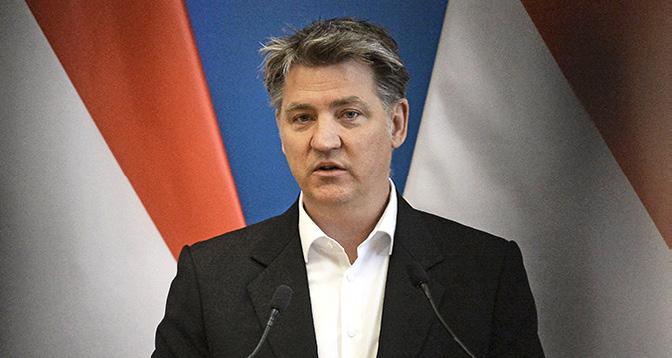
in March. The output of the computer, electronics and optical equipment sector, accounting for 9% of manufacturing, fell 13.8%. KSH confirmed that headline industrial output fell 4.1% year-on-year in March, slowing from a 4.6% decline in the previous month. Output fell 4% when adjusted for the number of workdays.
to stock to be able to meet the strict SLA [service level agreements]. These are the tendencies that are not entirely clear for the industry itself just yet, but everyone is in a rush because the deadlines for the actual manufacturing operation are very close.”
One advantage Hungary has is an excellent road network. What is more lacking, particularly in the east of the country, is a comparable rail network. Czifra thinks that is something the government will have to address (and in part already is through projects such as the Budapest-Belgrade highspeed rail link) as companies increasingly look for more sustainable alternatives to road transport. Audi, based in Győr in the west of the country, has primarily switched to direct rail transport, for example.
“For us as property developers, the most important concern so far was to be on the main transport routes. That’s why we are locating as close as possible to motorways. We have an industrial park (IGPark Polgár) with a [rail] spur, which has not been used at all in the last couple of years. But times are changing; potentially, we will have users for that now. But a lot of investment needs to be put in to keep not only the industrial spur alive but also the whole rail network that it connects to.”
Labor shortages are an issue everywhere, but there are less developed areas, such as the east, northeast, and south of Hungary, where the government encourages foreign-owned companies to locate through subsidy schemes. The question for developers like InfoGroup is whether there is a better financial case for getting ahead of the game in a pioneering role or waiting for more definitive interest.
“The assessment we need to make is whether it is worthwhile or not, whether it can be a profitable business or not. It’s quite expensive to develop now; is it worth putting together a scheme with a speculative building? Does it need to be tailor-made, or do we just prepare a plot that we can deliver relatively quickly; that’s where we need to find the balance.”
3 Special Report | 17 www.bbj.hu Budapest Business Journal | May 19 – June 1, 2023
Balázs Czifra
in
Automotive
IGPark Polgár.
Brief News
PRESENTED CONTENT
Photo Lajos Soós / MTI
Car Importers
Ranked by total net revenue in 2022 (HUF mln)
Audi, Volkswagen, Skoda, Seat, CUPRA, Volkswagen Haszonjárművek
Audi, Volkswagen, Skoda, Seat, CUPRA, Volkswagen Haszonjárművek
Audi, Volkswagen, Skoda, CUPRA, Volkswagen Haszonjárművek
balázs németh, mag. elmar geisler Tamás Acsai Zsolt Bujáki
1139 Budapest, Fáy utca 27. (1) 4515100 info@ porschehungaria.hu
3 toyota CentRal euRopeHungaRy kFt. www.toyota.hu
4 aW dIstRIbutIon kFt.(1) www.autowallis.com
Jaguar, Land Rover, Opel, Renault
Isuzu, Ssangyong, Jaguar, Land Rover, Opel, Renault, Dacia
Jaguar, Opel, Renault, Dacia AutoWallis Nyrt.(2) (100) –
Porsche Bentley, Porsche Porsche
Porsche Holding GmbH (100)
I Performance, Mini BMW, Mini BMW I –BMW Vertriebs GmbH (100)
Jacek pawlak –
andrew prest, tamás Wachtler(3) Attila Seres, Zsolt Fábián(3) Zsolt Jakab, Gabriella KelemenTűz(3)
2040 Budaörs, Budapark Keleti 4. (23) 885101 infohu@toyotace.com
2040 Budaörs, Szabadság út 117. (1) 4514851 info@autowallis.com
1133 Budapest,
út 96–98. (70) 4361100 internethu@ daimler.com
andrea
Szentendre,
József utca 3. (1) 7777555 inform@ford.com
szabolcs nagy –
anna Rita tonini, zoltán gombos, neil domonic Fiorentinos ––
1139 Budapest, Fáy utca 27. (1) 4515500 info@porschepest.hu
2220 Vecsés, Lőrinci út 59. (29) 555100 ugyfelszolgalat@ bmw.hu
1194 Budapest,
18 | 3 Special Report www.bbj.hu Budapest Business Journal | May 19 – June 1, 2023
Rank Company WebsIte t otal net R evenue I n 2022 (H u F mln) n o. o F ve HIC les sold I n 2022 seRvICes y ea R establ I s H ed CaR bRands oWneRsHIp (%) HungaRIan non-HungaRIan top loCal exeCutIve CFo maRketIng dIReCtoR addRess pHone emaIl s pa R e pa R ts supply F I nan CI ng Repa IR l eas I ng a ss I stan C e s e C ondH and C a R t R ade Fleet management Hyb RI d dI esel, gas e le C t RIC 1 magyaR suzukI zRt. www.suzuki.hu 858,496 128,536 ✓ – – – – – – 1991 Suzuki Suzuki –(0.01) Suzuki Motor Corporation (97.53), Itochu Corp. (2.46) atsumi masato ––2500 Esztergom, Schweidel J. utca 52. ––2 poRsCHe HungaRIa keReskedelmI kFt. www.porschehungaria.hu 421,477 A ✓ – ✓ – – ✓ – 1990
–(100)
www.lexus.hu 329,848 (2021) A ✓ – – – – – – 1990
––Toyota
(100)
Toyota, Lexus Toyota, Lexus
Motor Europe NVSA
–
www.renault.hu 247,318 31,172 ✓ – ✓ – – ✓ – 1991
5 meRCedes-benz HungáRIa kFt. www.mercedesbenz.hu 178,599 (2021) A ✓ – – – ✓ – – 2004 MercedesBenz MercedesBenz Mercedes EQ –MercedesBenz AG (100)
attori
Fabiola
––
6 FoRd közép- és keleteuRópaI éRtékesítő kFt. www.ford.com 153,347 (2021) A ✓ ✓ ✓ ✓ ✓ – ✓ 2000 Ford Ford Ford –Ford Motor Company (100)
Váci
–2000
7 poRsCHe InteR auto HungaRIa kFt. www.porscheinterauto.hu 109,432 A ✓ ✓ ✓ ✓ ✓ ✓ ✓ 1993 Bentley,
kővágó-laky, viktor szamosi –
Galamb
–
–
8 bmW HungaRy kFt. www.bmw.hu 103,411 (2021) A ✓ ✓ ✓ ✓ ✓ ✓ – 2004 BMW
9 F automobIl ImpoRt. kFt. www.fiat.hu www.alfaromeo.hu www.jeep.hu www.fiatprofessional.hu www.abarth.hu 72,000 4,891 ✓ ✓ ✓ ✓ ✓ ✓ – 1992 Alfa Romeo, Fiat, Fiat Professional, Jeep Alfa Romeo, Fiat, Fiat Professional, Jeep Fiat, Fiat Professional, Jeep Frey Automobil Holding Kft. (100) –györgy balkányi Attila Sávoly Tünde Krupp, Szabina NagySzentkuti
André Citroën utca 47. (1)
kapcsolat@
10 kIa HungaRy kFt. www.kia.com 54,732 (2021) A ✓ – – – – – – 1995 Kia Kia Kia –KIA Austria GmbH (100) norbert lászló nagy, kim kuyjung ––
Budafoki út 56. (1) 3242000 info@kiamotors.hu
3484848
fautomobilimport.hu
1117 Budapest,
notes: (1)
Kft and
(2)
Aston Martin, Lotus, Ineos
Infiniti, Aston Martin, Lotus, Ineos
Aston Martin, Lotus, Ineos (100) –
zsófia bálint kovácsné Attila Sávoly Zoltán Mocsai
1194 Budapest, André Citroën utca 1. (1) 2795555 kapcsolat@ pautomobilimport.hu
1194 Budapest, André Citroën utca 1. (1) 3484848 kapcsolat@ cautomobilimport.hu
2040 Budaörs,
1117 Budapest, Infopark sétány 1. (1) 4645000 mazda@mazda.hu
Heinz schneiter ––
gábor Ferenc gablini ––
1149 Budapest, Mogyoródi út 34–40. (1) 4709010 info@subaru.hu
1141 Budapest, Nótárius utca 5–7. (1) 7992250 infiniti@gablini.hu
3 Special Report | 19 www.bbj.hu Budapest Business Journal | May 19 – June 1, 2023 A = would not disclose, NR = not ranked, NA = not appliacable This list was compiled from responses to questionnaires received by May 17, 2023, and publicly available data. To the best of the Budapest Business Journal’s knowledge, the information is accurate as of press time. The list is based on companies’ voluntary data submissions. While every effort is made to ensure accuracy and thoroughness, omissions and typographical errors may occur. Additions or corrections to the list should be sent on letterhead to the research department, Budapest Business Journal, 1075 Budapest, Madách Imre út 13–14, or faxed to (1) 398-0345. The research department can be contacted at research@bbj.hu Rank Company WebsIte t otal net R evenue I n 2022 (H u F mln) n o. o F ve HIC les sold I n 2022 seRvICes y ea R establ I s H ed CaR bRands oWneRsHIp (%) HungaRIan non-HungaRIan top loCal exeCutIve CFo maRketIng dIReCtoR addRess pHone emaIl s pa R e pa R ts supply F I nan CI ng Repa IR l eas I ng a ss I stan C e s e C ondH and C a R t R ade Fleet management Hyb RI d dI esel, gas e le C t RIC 11 gRand automotIve CentRal euRope kFt. www.nissan.hu 45,001 (2021) A ✓ ✓ ✓ ✓ ✓ – – 2019 Nissan Nissan, Piaggio Nissan Grand Automotive Kft. (100) –viktor gyula molnár ––1124 Budapest, Csörsz utca 49–51. (80) 333888 hungary@ nissanservices.eu 12 volvo autó HungáRIa kFt. www.volvocars.hu 41,000 2,588 ✓ – – – – – – 1995 Volvo Volvo Volvo –Volvo Car Corporation (100) gábor bodrogai Ágnes Tárkányi Andrea Sztárcsevity 1044 Budapest, Váci út 50–58. (30) 2423727 huinfo@volvocars.com 13 HyundaI HoldIng HungaRy kFt. www.hyundai.hu 33,619 (2021) A ✓ – – – – – – 2007 Hyundai Hyundai Hyundai –AutoBinck Car Distribution and Retail B.V. (100) pál kovács ––1186 Budapest, Cziffra György utca 15. (1) 8875700 info@hyundai.hu 14 p automobIl ImpoRt kFt. www.peugeot.hu 29,593 3,167 ✓ ✓ ✓ ✓ ✓ ✓ – 1993 Peugeot, DS Peugeot, DS Peugeot, DS Frey Automobil Holding Kft. (100) –györgy balkányi,
15 C automobIl ImpoRt kFt. www.citroen.hu 18,403 2,540 ✓ ✓ ✓ ✓ ✓ ✓ – 1994 Citroën Citroën Citroën
(100)
Sávoly Nóra
Frey Automobil Holding Kft.
–györgy balkányi Attila
Hajdu
16 Honda motoR euRope lImIted magyaRoRszágI FIóktelepe www.honda.hu 12,785 A ✓ ✓ – – – – – 1993 Honda Honda Honda –(100) Iwama
shigeki ––
17 mazda motoR HungaRy kFt. www.mazda.hu 10,871 (2021) A ✓ – – – – – – 1992 Mazda Mazda ––Mazda Motors Logistics Europe NV (100)
graham mcgonigle Erika Káldi
Puskás Tivadar út 1. (23) 506406 iinfo.hu@ hondaeu.com
tibor együd, david
–
18 mm ImpoRt kFt. www.mitsubishi.hu 5,590 (2021) A ✓ – – – – – – 2004 A Mitsubishi A Emil Frey Automobil Holding Kft. (100) –gábor
schneiter ––
mátrai, Heinz
19 emIl FRey ImpoRt kFt. www.subaru.hu 1,252 96 ✓ – – – – – – 1993 Subaru Subaru Subaru Emil Frey
–
1149 Budapest, Mogyoródi út 34–40. (1) 4223910 gabor.matrai@ mitsubishimotors.hu
Automobil Holding Kft. (100)
gábor mátrai,
20 gablInI pRemIum kFt. www.infiniti.hu 255 (2021) A ✓ ✓ ✓ ✓ ✓ ✓ ✓ 2007
Infiniti,
Infiniti,
Data of Renault Hungária
its predecessors are included.
Renault Hungária Kft is owned by AutoWallis Nyrt. (50); Salvador Caetano Auto, SGPS, SA (50). (3) Manager of Renault Hungária Kft.
4 Socialite Petőfi Cultural Agency: Shining the Spotlight on Hungarian Literature
Like all avid readers, I’m happy wandering around any bookshop in the world, even if I can’t read the language in which the books are written. But when I visit my local bookshop, I’m increasingly frustrated by not being able to read Hungarian while knowing there’s probably literary gold between them thar covers. If I do find an interesting-looking Hungarian book translated into English, my problem is that I have no idea how well it captures the essence.
When I discovered the existence of the Petőfi Cultural Agency (PKÜ), which, among other things, promotes Hungarian literature in translation, my eyes lit up behind the smeared lenses of my reading glasses.

PKÜ was launched in
2020.
As well as showcasing Hungarian literature overseas, it promotes work written in Hungarian in this country and builds bilateral relations between literary communities on different continents.
The agency organizes an international writers’ residency program, publishes two magazines dedicated to literature in translation, and co-organizes the PesText international literary festival. The man it is named for is worthy indeed.
“Sándor Petőfi was one of the greatest poets not only of Hungarian literature but of world literature. He’s the only Hungarian to be mentioned by the
incredibly erudite Argentinian Jorge Luis Borges, and the only Hungarian to be included in Harold Bloom’s infamous ‘The Western Canon,’” says Dániel Levente Pál, the PKÜ’s director responsible for literary affairs.
“There is much debate about what is Petőfi’s ‘secret?’ In one word, its adaptability. He was a true chameleon! When he was in a wine bar, he wrote the best wine poetry of the age. When he was in love, he wrote wonderful love poems. When he was feeling low, he wrote death poems. When the revolution broke out, he was at the forefront as a poet. He could write about anything. He could be touchingly intimate and engagingly personal. And we’re talking about a life’s work of thousands of pages produced in just 26 years. He’s an incredible literary figure,” Pál enthuses.
“The Continental Literary Magazine,” published by PKÜ, is dedicated to translated literature. With a circulation of 4,000 issues, its primary aim is to introduce Hungarian and Central European literature to a global English readership and create a platform for writers from this region to get into the mainstream North American literary scene.
American Influence
The only European literary magazine available in Barnes & Noble stores in the United States, “The Continental”
is also available in the United Kingdom and can be ordered online.
In its third issue, “The Continental” explores aspects of faith. Apart from work by award-winning Hungarian writers such as the Pécs-born Viktor Horváth, the magazine includes an interview by American author and political activist Marianne Williamson.
PKÜ also actively represents Hungarian literature at prestigious events such as the Cairo, Delhi, Bologna, London, and Leipzig Book Fairs.
In Cairo, Hungary was officially represented at an Arabic language fair for the first time. More than 20 books translated into Arabic were promoted, and six authors were present in person. Delhi also saw the Indian debut of a Hungarian stand. Here the PKÜ presented Hungarian authors Judit Berg (author of the Rumini children’s books) and Péter Szűcs (novelist and travel writer) to the most important Indian publishers.
At this April’s London fair, the spotlight was on women. Contemporary Hungarian women’s poetry anthology “Shelter under the Sun” and Krisztina Tóth’s book “Barcode” were presented in two separate events. The translator, Peter Sherwood, was awarded the prestigious English PEN translation grant for “Barcode” last year.
In May, PKÜ presented five translated books to German readers in Leipzig and
3
to a Czech audience in Prague. It also began working as a member of the Central and East European Book Market to develop even closer links in our region.
As PKÜ’s director responsible for literary affairs, a significant part of Pál’s role is organizing projects with the organization’s partners worldwide. He’s also committed to “finding the right audience for the right book [...] the average reader gets lost in the confusion of abundance. It’s our job to create the right rendezvous,” he explains.
Strong Writing Generation
Fortunately, Pál is part of a generation of strong writers. “Wonderful and popular books are published every year, and authors speak with confidence about themselves and their work at home and abroad.”
At the moment, according to Pál, crime fiction (mainly by women) and storytelling prose are particularly popular with Hungarian readers and foreign publishers.
“Every year, exciting new Hungarian crime fiction appears,” Pál told me. “Storytelling prose seems to be the fiction response to the popularity of work dealing with transgenerational trauma.”
Looking to the future, Pál is confident that Hungarian literature will continue to go from strength to strength.
“Authors and publishers are full of good ideas and good books. Our role is to continue to promote these at home, in schools and cultural centers, and abroad in bookshops, cafés, galleries and book fairs. Alongside our program of activities, we offer well-targeted translation grants and calls for submissions,” he notes.
After I explained to Pál that I wasn’t sure where to start with Hungarian literature, he recommended contemporary authors András Visky, Andrea Tompa and György Spiró. From the recent past, he suggested Magda Szabó, Imre Kertész and Sándor Márai.
“These are master storytellers, and there’s a humanity in all of their books,” he said.
You can subscribe to “The Continental” magazine at continentalmagazine. com. You can find Hungarian books translated into English at (among others) Atlantisz Book Island, Massolit Books & Café, Bestsellers, Famulus, and Bookstation, a small and homely bookstore in District XIII offering new and secondhand books in English, German, French, Italian and so on.
www.bbj.hu Budapest Business Journal | May 19 – June 1, 2023
DAVID HOLZER
Dániel Levente Pál
“Always one Step Ahead,” Teodóra Bán has Run the Margaret Island Open-Air Theater for 20 years


The Open-Air Theater on Margaret Island is one of the most distinctive venues of Budapest’s cultural life. Teodóra Bán, the theater’s managing director and artistic director, is a prominent member of the capital’s cultural life. This year is her 20th directing the venue. She says her motto is “Always one step ahead!”
2023 is not only her 20th anniversary; a year of landmarks and celebrations will be marked on Margaret Island: the Open-Air Theater is 85 years old, the capital Budapest is 150 years old, the bicentenary of the birth of Sándor Petőfi falls on this year, and the first Jurassic Park film is 30 years old, which the theater has also decided to celebrate.
BBJ: In 2023, you will have been running the Open-Air Theater on Margaret Island for 20 years. How do you assess this period?
Teodóra Bán: Running the Margaret Island Theater, its professional goals and its benefits for the audience and the performing arts profession is a major challenge and a unique task. Looking back on 20 years of operation, I have formulated my motto, my ars poetica: “Always one step ahead!” Translated into
busy everyday life, this means looking ahead and constantly developing and building in search of new goals.
BBJ: Besides the theater, you have always had other positions, tasks and vocations. Could you briefly take us through the stages?
T.B.: During these 20 years, I spent eight years in parallel in the service of culture and tourism, managing two large companies in the capital under Mayor István Tarlós. Budapest is the capital of culture and the four seasons. That was our slogan! We have achieved significant successes in national and international communication through the production and transmission of cultural content. Under my leadership, Budapest won the European Best Destinations award. In addition to the Budapest Spring and Autumn Festivals, we added cultural value to the Christmas and Easter fairs
on Vörösmarty tér, the Budapest Card enjoyed its heyday, and our tourist center and office network attracted foreign visitors to the capital with record results.
BBJ: From 2022, you will also serve as the director general of public relations and communications at Károli Gáspár Reformed University and lead the theater.
T.B.: Yes, I was able to build up the major tasks and concept of the 30th anniversary of the KRE Commemorative Year, alongside Rector László Trócsányi. The synodal commemorative meeting opening the commemorative year was organized in the spirit of science, culture and education at the Hungarian Academy of Sciences, a charity concert was organized at the Academy of Music to present social commitment for the city of Aleppo in Syria, a city hit by the earthquake, and the 30-year commemorative book and the documentary film in preparation present the historical past and significance of church higher education today. We continue to organize a number of international and national conferences, and the concept of the conditions for a sporting university has been realized - to highlight just a few of our projects.
BBJ: Can you choose between positions and tasks? I see that in all your roles, in your everyday life, the dissemination of culture in a broad sense, the theater and production work, is of particular importance.
T.B.: As you can see, theatre for me, as a cultural community space, man-made and man-made products, wherever I am, will always be present in my life in this context. So I can say that the most important part of living in a community is: making theatre, which is a source of joy for me.
BBJ: What happened in practice?
T.B.: Going back to 20 years, I can say that in the past two decades, the environmental and economic changes in our living space and in society, both domestic and international, have significantly transformed the consumption of culture. The management of the theater has necessarily had to follow this period, to use and incorporate its experience, to react to the current trend or challenge, developing its own flexible professional and operational strategy, able to generate demand and increase its audience base.
BBJ: What was and what is your philosophy today?
T.B.: For me, the biggest patron is the paying and returning audience, which, if appreciated and not underestimated, enables a theater to maintain its high quality and valuable professionalism. The only way to consciously increase the number of theatre-goers is not primarily by increasing the number of performances but by expanding the range of genres. Thus, each genre has its rightful place in today’s almost four-month season of the Margaret Island Theater. Opera, ballet, folklore, dance and music performances, prose performances, musical and operetta performances, classical symphonic concerts, pop, rock, and jazz concerts, children’s performances, family activities, and exhibitions all play a part in maintaining the theater. This complex communitytheater space is run by constantly inviting national stars, ensembles, international stars, and companies.
BBJ: As usual, the Margaret Island Theater has an extensive range of performances. What would you highlight for us from this year’s repertoire?
T.B.: Just a few of the most exclusive ones: the Sukhishvili Georgian National Dance Company, the concert of the star orchestra Chico and The Gypsies and the Romengo pre-band, the operetta premiere of “The Count of Luxembourg” with the Kecskemét National Theater, the ballet performance of “Romeo and Juliet” with the wonderful Maribor Ballet Company, “My Love is Tango!” a sultry Piazzolla evening, “Tango with the Stars!” with a symphony orchestra, the “Golden Age Opera Gala” stars Pretty Yende and Nadine Sierra, and Verdi’s magnificent opera “Attila,” with the Canadian John Relyea in the title role, one of the most charismatic and best opera singers of our time.
4 Socialite | 21 www.bbj.hu Budapest Business Journal | May 19 – June 1, 2023
PRESENTED CONTENT margitszigetiszinhaz.hu/en
Teodóra Bán. Photo by Gergely Vogt.
Photo by Gálos Mihály Samu.
Celebrating St. George With Charity Fundraising
The celebration of St. George and England drew a full house to the ballroom of the Budapest Marriott Hotel on April 22, also raising HUF 1.924 million for the Food Bank for Ukrainian Conflict Refugees in Budapest and UNICEF, to help children affected by the earthquakes in Turkey and Syria, the two charities say.
Dignitaries included Ambassadors Paul Fox (United Kingdom), Désirée Bonis (the Netherlands) and Camilo Sanhueza (Chile).
“We can and should celebrate our heritage, our history and our culture,” said Fox in his opening speech. St. George, adopted as England’s patron saint around the early 1400s, has a “shared significance for many,” he added. Greece, Bulgaria, Ethiopia and Syria also have the saint as a patron, among others.
“It was an honor and a pleasure to attend the second St. George’s
Day celebration organized by XpatLoop. [….] I was proud to be a part of this event, which is becoming a fixture in Budapest’s social calendar,” Ambassador Fox said after the event.
Stephen Linfitt, the publisher of XpatLoop.com and event organizer, noted that St. George’s Day is heralded as the arrival of spring in the traditional Ukrainian calendar.
“England’s patron saint was a truly international figure.
St. George is a positive symbol of multiculturalism, as the great range of guests here tonight shows,” Linfitt said.
English Rose
He presented red roses (the symbol of English county Yorkshire and the national rugby union team) to key ladies and thanked everyone for joining the event.
“It’s what St. George stands for that counts most, basically the courage to face adversity in order to defend the innocent. That’s why tonight it’s appropriate to stand with Ukraine, and specifically to help the innocent affected by the conflict,” Linfitt concluded.
Event MC and actor Alexis Latham gave his take on St. George’s Day, the day on which Shakespeare was both born and died in 1616, then introduced the Reverend Frank Hegedűs, the priest at St Margaret’s Anglican Church in Budapest who gave a light-hearted talk on the life and legacy of St. George.
in Brief News Culture
Local Events Industry Returns to Growth Path
Gábor Ganczer, the head of the Hungarian Association of Event Organisers and Service Providers (MaReSz), said the local events industry has returned to the growth path after a difficult period during the pandemic, according to turizmus.hu. Ganczer, who is also CEO of Hungexpo Budapest Congress and Exhibition Center, said that turnover of Hungary’s events industry had exceeded 2019 levels last year and was expected to grow further in 2023. None of MaReSz’ 150 members, which account for 60-70% of the events market, went bust during the one-and-a-half-year industry
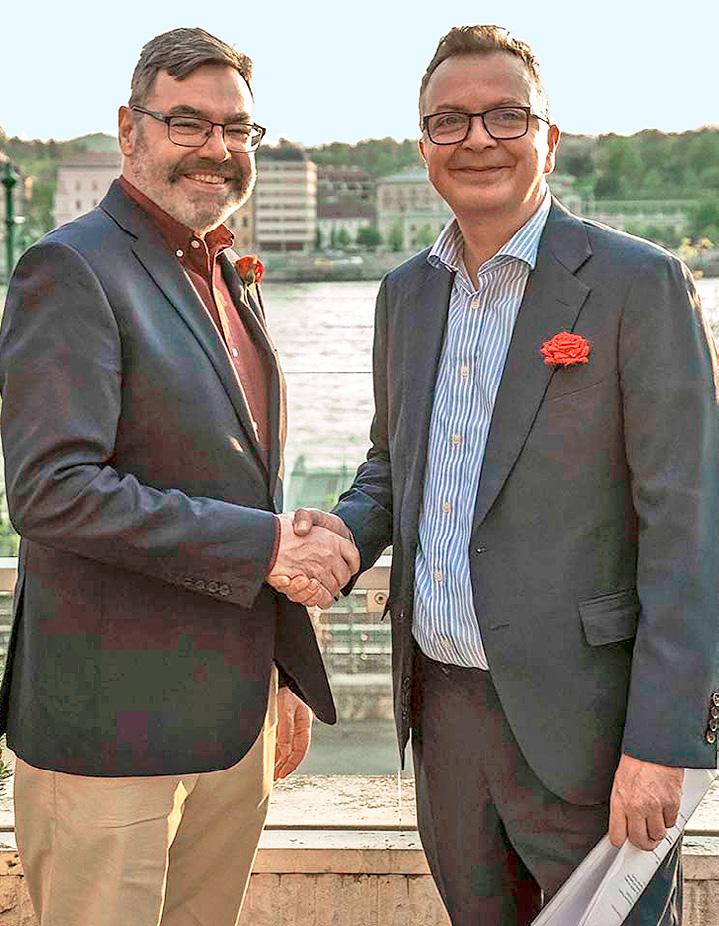
pause, he said, although there was some consolidation. Speculation that events would continue online after the pandemic has proven to be mistaken, he added. He pointed to noticeable caution, last year, among international event organizers regarding venues in Hungary because of the war in neighboring Ukraine, but said it now appears “they understand that Hungary is a safe place.” Last year, Hungexpo had revenue of HUF 8.8 billion, up from HUF 8.3 bln in 2019.
Agri Ministry Announces HUF 450 mln Hungarikum Tender
With a budget of HUF 450 million this year, the Ministry of Agriculture is announcing the Hungarikum
tender in three target areas: making publications, organizing contests, and preserving the culture of clothing, Minister of Agriculture István Nagy announced at his press conference on May 15, writes profitline.hu. The minister recalled that the law on Hungarian national values and Hungarian heritage adopted by the Parliament more than a decade ago was created to provide an appropriate legal framework for the identification, collection, and documentation of values important to the Hungarian people as a whole.
Cornerstone Laid of EUR 11 mln Virtual Production Film Studio
Hungary’s Visual Europe Group laid the cornerstone of an EUR 11 million virtual production film studio, the biggest in Central and Eastern Europe, in Fót (20 km northeast of Budapest) on May 11, according to kultura. hu. Construction of the VP film
TV personality Zsuzsa Demcsák led the auction, which included a waterpolo ball signed by members of Hungary’s Olympic and European Championship winning men’s team.
There was plenty of food and drink on offer, including English classics like fish and chips and curry. In additions to games and other diversions, there was also a broad range of musical entertainment.
Concert pianist Mariann Marczi serenaded guests with classical renderings of Elgar, Purcell and Handel before an uptempo version of Jerusalem was sung by opera singer Lucie Juránková.
Globetrotting six-piece band Just Showband covered English pop and rock touchstones and dance numbers in two sets, while tribute band the Bowie Boys also entertained the crowd.
DJ Woods played tunes from England’s pop and rock canon, and it was time to throw a few shapes on the dancefloor and cap off the event with pure partying until early the next morning.
But perhaps the musical highlight, gaining a standing ovation, was a choir of 14 Ukrainian children, mainly from the east of the country and displaced by the war and attending the Ukrainian Refugee Educational Project at the American International School of Budapest. The children were led by Oksana Matviishyna, who happened to be in Hungary with her children when the war broke out.

A qualified teacher with 25 years’ experience, she was allowed to set up “a school within a school” at the AISB, allowing around 300 refugee children to continue their education in their own language, retain their identity and regain a modicum of normality.
studio, which uses LED panels as set backdrops, is set to finish in Q1 2024. Visual Europe Group CEO Szabolcs Botond called virtual technology “the future of film production,” adding that it was expected to be used in nearly 70% of films.
Hungary Withdraws as Host of 2024 European Figure Skating Champs
Hungary is withdrawing as the host of the 2024 ISU European Figure Skating Championships because of the economic impact of the war in Ukraine, the Hungarian National Skating Federation said in an announcement, according to the daily newspaper Magyar Hírlap [Hungarian Newsletter]. The federation noted the significant impact of energy prices on the sport and said it had returned the hosting rights after long deliberation. Budapest was awarded the hosting rights for the championships in June 2021.
22 | 4 Socialite www.bbj.hu Budapest Business Journal | May 19 – June 1, 2023
Ukrainian children’s choir.
The U.K. Ambassador to Hungary Paul Fox (left) and Stephen Linfitt, publisher of XpatLoop. com and organizer of the St. George’s Day event.
Chamber of Commerce Corner
NetherlandsHungarian Chamber of Commerce (Dutcham)

The sixth gala dinner, marking the 21st birthday of Dutcham, was an elegant yet cozy event with fine food, live entertainment and valuable raffle items. Dutch Ambassador Désirée Bonis welcomed the guests alongside Katinka Zinnemers, Dutcham chair, highlighting the long-standing, fruitful cooperation between the embassy and the chamber. An Indonesian dinner, a live performance by Zoltán Berecki, and the drawing of the raffle prizes followed. The beneficiary of the charity raffle was Kórházsuli, an initiative that helps hospitalized children continue their studies during their treatment.
Belgian Business Club in Hungary (BELGABIZ)
Belgabiz held its general assembly on May 11 at the Embassy of Belgium. The newly elected president is Jim Bauters, with the management board comprising Szonja Bender (Flanders Investment & Trade); Koen Maegherman (K&H Group); Zoltán Nagy (Reynaers Aluminium Kft.); Edit Ránky (AWEX-hub.brussels); Nicky Roosen; Raphael Schröder (Embassy of Belgium); Pascal Steens (Multicase Advisory); Zsolt Tóth (Delaware Hungary); Samuel Vangerven (Stardex
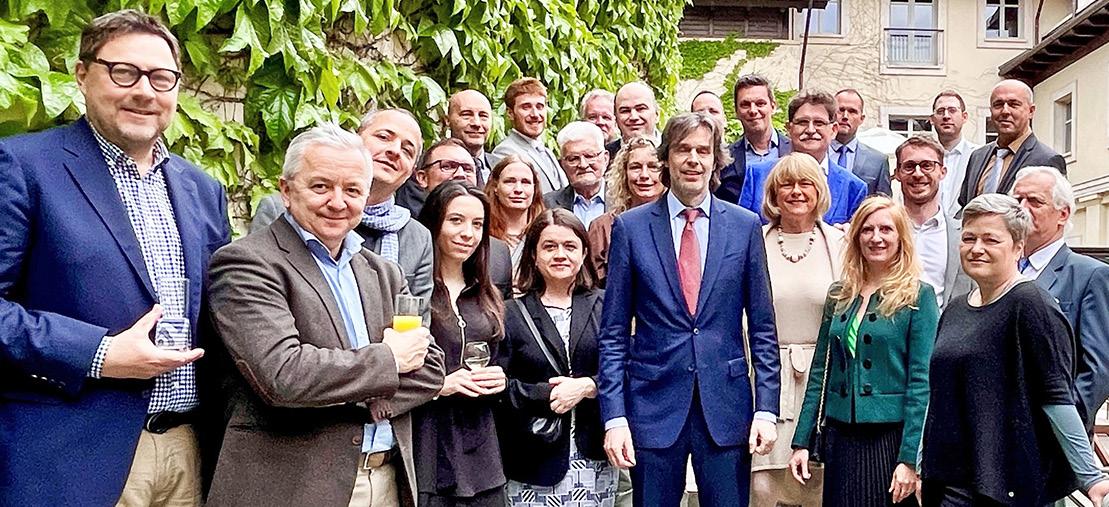
Kft.); and Nico Verhelst. The supervisory board is Gyöngyi Ferencz (VGD Hungary), Györgyi Viszmeg, and Mark Weytjens. Belgabiz looks forward to working together to lead the Belgian business community in Hungary in “growing stronger and smarter together.” After the meeting, participants were invited by Siegfried Peinen, the Ambassador of Belgium and honorary chairman of Belgabiz, to a networking reception at his official Residence.
French-Hungarian Chamber of Commerce and Industry (CCIFH)

Whistleblowing: What can we expect? This Hungarianlanguage event features Andrea Belényi, associate, and Zoltán Csernus, lawyer, both of VJT & Partners.
• When: Tuesday, May 25, 12:002:00 p.m.
• Where: MGallery Hotel Nemzeti Budapest, József körút 4, 1088 Budapest • Cost: Members HUF 12,000 (+ VAT); nonmembers HUF 18,000 (+ VAT) Communication Club
La vie en magenta! Corporate communication at Telekom. Hungarian-language events with Flóra Németh, PR professional manager at Magyar Telekom
• When: Wednesday, May
31st, 2023, 9:00-10:30 a.m.
• Where: MGallery Hotel Nemzeti Budapest, József körút 4, 1088 Budapest. • Cost: Members HUF 9,900 (+ VAT); nonmembers HUF 14,900 (+ VAT) HR Burnout Inhumane resource management, or when can an HR employee burn out?
Dr. Júlia Füredi, organizational psychologist and founder of sparQ tech, leads this Hungarian-language event.
• When: Tuesday, June 6, noon2 p.m. • Where: Well Point event venue, Europa Design, Törökvész út 71-75, 1025 Budapest. • Cost: Members HUF 9,900 (+ VAT); non-members HUF 14,900 (+ VAT)
American Chamber of Commerce in Hungary (AmCham)
As a business, do you feel uncertain about how to adapt to rapidly changing regulations? Would you like to know how current conflicts and subsequent sanctions impact businessrelated regulations and compliance? Join Amcham’s Compliance Conference to discuss the geopolitical realities of the ongoing war in Ukraine and other potential conflicts and learn about the practical aspects of complying with sanctions as a business, including the risks and pitfalls and the surprisingly high penalties.
AmCham will host Botond Feledy, director of Tipping Point Consulting, a geopolitical risk analyst and EU expert, and Ramsey Jurdi, an international dispute, regulatory and trade compliance lawyer at DLA Piper with substantial experience of economic sanctions as guest speakers at the conference.
• When: Wednesday, June 7, 9 a.m.-1:30 p.m.
• Where: Párisi Udvar Hotel Budapest, Petőfi Sándor u. 2-4, 1052 Budapest
• Cost: Members HUF 34,990 (+VAT); nonmembers HUF 45,000 (+ VAT)
This regular section of the Budapest Business Journal features news and events from various international business chambers. For further information and to register for specific events, visit the website of the organizing chamber. If you have information for inclusion on this page, send an email in English to Annamária Bálint at annamaria.balint@bbj.hu
German-Hungarian Chamber of Industry and Commerce (DUIHK)
The DUIHK celebrates its 30th anniversary this year. The highlight will be a gala evening on June 2 at the Hotel Mariott. Guests, including President of the Republic of Hungary Katalin Novák, will enjoy an unforgettable evening of culture and entertainment, dancing, excellent food and drink specialties, and, of course, many personal meetings and discussions.
• When: Friday, June 2, 7-11 p.m. • Where: Budapest Marriott Hotel, Apáczai Csere János utca 4, Budapest 1052. • Cost: Members EUR 150 per person; non-members EUR 280 per person; company table EUR 2,000.
Canadian Chamber of Commerce in Hungary (CCCG)
British Chamber of Commerce in Hungary (BCCH)

The BCCH had the pleasure of attending the exclusive opening of the Hungarian National Museum’s new exhibition titled “Királyi hétköznapok” (Royal Weekdays) featuring fine china from Herendi Porcelánmanufaktúra. These included a British twist with some of the finest wares exhibited being part of the “Queen Victoria evolution,” a selection of tableware ranging from the classical 1851 pattern to the Royal Garden pattern, made to commemorate Prince William’s wedding. BCCH chairman Duncan Graham served as the exhibition’s patron. In his opening speech, he highlighted the high prestige of Herendi Porcelán in the United Kingdom and its long history in the country going back to the 1851 World Fair. Graham opened the event alongside László L. Simon, director general of the Museum, and Attila Simon, executive director of Herendi Porcelán.
The CCCH is gearing up to celebrate a significant milestone, the 10th anniversary of its highly anticipated Canadian and Salmon Dinner. Set to take place on May 31 from 6-11 p.m. at Öbölház (1117, Budapest, Kopaszi-gát 2), this eagerly awaited event promises an unforgettable evening of gastronomic delights, live jazz music, refreshing drinks, and exciting raffle opportunities. As the name suggests, the dinner showcases the finest Canadian cuisine, focusing on bison and salmon. Attendees will have a chance to indulge in various mouthwatering dishes featuring freshly made food and an array of flavorful side dishes. From classic grilled bison and salmon to innovative culinary creations, this event is a true pleasure for food enthusiasts. Live jazz music will fill the air, creating a sophisticated and lively atmosphere. Accomplished musicians will take the stage, captivating the audience with their tunes and setting the perfect backdrop for an enchanting evening of celebration and networking. Whether attendees are jazz aficionados or simply enjoy smooth rhythms, the musical performances are bound to leave a lasting impression. The CCCH’s 10th Canadian Bison and Salmon Dinner provides an excellent platform for networking and creating new business opportunities. To add an element of excitement to the festivities, the chamber will hold a raffle. Attendees will have the chance to purchase raffle tickets, with the opportunity to win attractive prizes.
• When: Wednesday, May 31, 6-11 p.m.
• Where: Öbölház, Kopaszi-gát 2., 1117 Budapest
• Cost: Members HUF 43,900 HUF (+ VAT); non-members HUF 56,900 (+ VAT).
Swiss-Hungarian Chamber of Commerce (Swisscham)
The diversity of Swisscham events was well demonstrated in the last few days: it organized a salsa dance class, visited the renovated Opera House, and had a networking evening with Dutcham Hungary and the Swedish Chamber of Commerce. Swisscham thanks its partners and many enthusiastic guests for these times.
4 Socialite | 23 www.bbj.hu Budapest Business Journal | May 19 – June 1, 2023
































 ROBIN MARSHALL
ROBIN MARSHALL


















